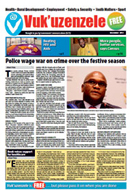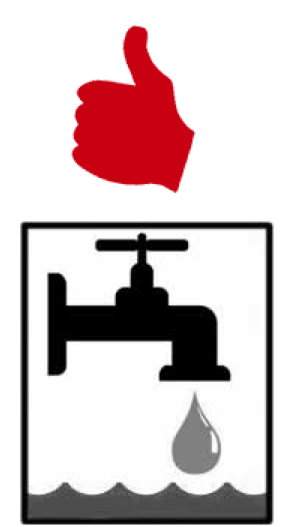Dec 2012
Dec 2012 sadminEmployment news
Employment news sadminEmployment news
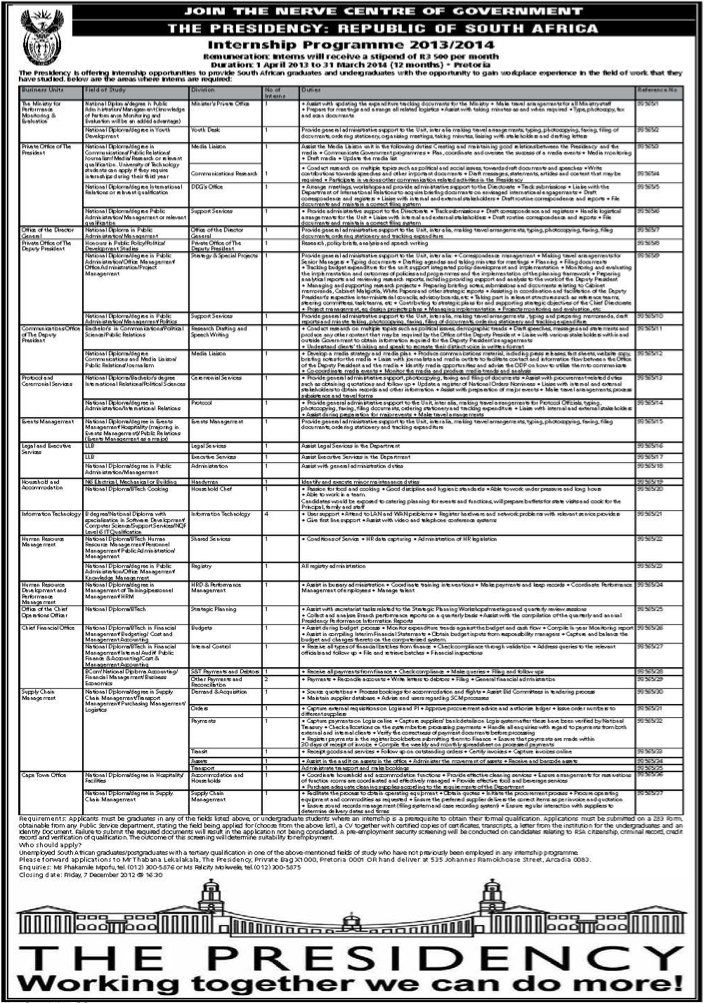
Police wage war on crime over the festive season
Police wage war on crime over the festive season sadminThe South African Police Service (SAPS) will be out in force this festive season, patrolling all tourist destinations and prioritising robberies, cash-in-transit heists and ATM bombings.
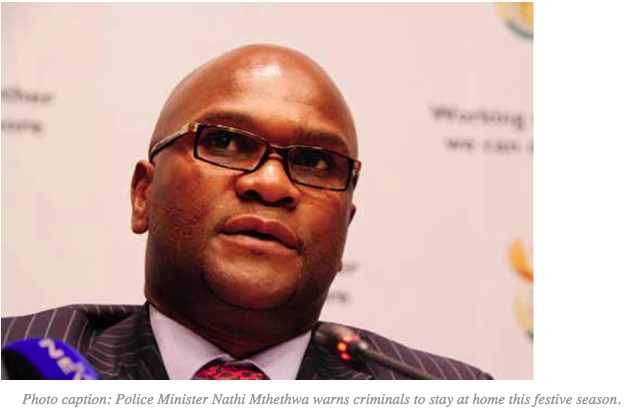 Special attention will also be given to preventing social crimes such as murder, rape and crimes against women, children and the elderly, as well as house and business robberies, said Minister of Police Nathi Mthethwa at the launch of the festive season plan.
Special attention will also be given to preventing social crimes such as murder, rape and crimes against women, children and the elderly, as well as house and business robberies, said Minister of Police Nathi Mthethwa at the launch of the festive season plan.
The plan - “Safer Festive Season: Operation Duty Calls” - started in September and will continue until March 2013.
Partner with Police
The minister said: “Our main objective is to call upon all South Africans to partner with the police in fighting the scourge of crime. This year’s operations will build upon the previous year’s lessons and successes. We will also increase high-visibility patrols at all tourist destinations especially in the coastal cities.” During the festive season, crime levels tend to go up owing to high levels of spending among consumers and an increased consumption of alcohol.
Drug trade
Speaking at the launch of the plan in Jane Furse, Limpopo, Minister Mthethwa said: “The drug trade and its associated problems continue to grow in most parts of the world, primarily because global abuse and accessibility of drugs has become increasingly complex, as trafficking routes have become shorter, more diverse and more easily traversed.” He added that police would also continue with the fight against piracy. “As part of the broader fight against crime during last year’s festive season, we launched the Anti-Piracy and Counterfeit Goods Campaign.”
This campaign is led by the police in partnership with the departments of Trade and Industry and Home Affairs, the South African Revenue Service, the National Prosecuting Authority, the Southern African Federation Against Theft, the Recording Industry of South Africa Films, the Publications Board and artists who are direct victims of piracy.
Minister Mthethwa also called on communities to support police in fighting crime.
Safe and secure
Limpopo’s Safety, Security and Liaison MEC Florence Radzilani said different law enforcement agencies in the province would all play a role in ensuring a safe festive season.
Limpopo Police Commissioner Lieutenant-General Simon Mpembe said that with the expected influx of people into the province, police had plans in place to keep residents and visitors safe and secure.
He said the province had already made several arrests of wanted suspects in the past few weeks and destroyed more than 6 000 firearms, most of which were confiscated during operations and arrests.
Police in Limpopo will target areas that have a history of contact crimes, while officials from the South African Revenue Service and the Liquor Board will visit liquor outlets.
Police in the province received 14 BMWs to use in their fight against crime. Mpembe said police would be everywhere during the festive season.
“This festive period in Limpopo, criminals will certainly feel uncomfortable and unwanted as police will go out in full force to ensure a safe, secure and happy season for all its citizens,” said Mpembe.
High police visibility
The commissioner assured residents that police officers in the province had pledged their commitment to make Limpopo safer over the festive season. He said the community could expect high police visibility. There will be mobile roadblocks coupled with stop-and-searches and other crime prevention activities.
Meanwhile, officials in the City of Cape Town will be on high alert for any person breaking the law during the festive season.
Chief of Cape Town Metro Police Wayne Le Roux said they are ready to deal with increasing crime levels during the holidays.
Integrated operations
“The message is clear; one death is one too many. This is in line with the City Of Cape Town Safer and Caring City. We will be having joint integrated operations with the South African Police Service and other role-players such as traffic and law enforcement agencies,” Le Roux said.
“Our focus will be on drug houses especially council rental stock, stop and searches and roadblocks, strong emphasis on drunken driving and un-roadworthy vehicles,” he added.
There will be a zero tolerance policy for people taking liquor to the beaches, Le Roux warned. “There will be roadblocks, visible policing, bobbies-on-the-beat and strong covert operations near ATMs, where people could be robbed,” he added. Le Roux said the operation would continue until the Easter period.
Avoid unsafe situations
Although law enforcement agencies will do everything in their power to ensure a safe festive season, people are urged not to expose themselves to crime. This includes staying away from isolated areas, especially when alone at night and drawing money at ATMs, not carrying expensive items and avoiding unsafe hitch-hiking.
Book voices support for healthcare
Book voices support for healthcare sadminEveryday you make choices about your life and your health that can make you stronger, if you choose wisely. Often you can decide what you eat, how much you eat, how physically active you are and if you smoke or drink alcohol,” says the voice of actress Lillian Dube, booming out of a book.
“Being overweight increases your risk for illnesses like diabetes, high blood pressure and heart disease, your body needs the right foods to work properly,” Dube tells us.
The speaking book that bears Dube’s voice was recently launched by the Department of Health in partnership with the International Council of Nurses (ICN), Pfizer and the South African Depression and Anxiety Group. It is the first speaking book helping people to avoid non-communicable diseases (NCD).
Aimed at intensifying the fight against NCDs like cancer, diabetes and heart disease, the book highlights the importance of health literacy and the safe use of medicines. According to the World Health Organisation, about 25 per cent of all deaths in South Africa are related to NCDs.
The book is titled “Growing Your Health”
and uses voice clips narrated by Dube, who is a breast cancer survivor. It provides 16 pages of information about various diseases and explains the importance of healthy eating, healthy lifestyle choices and tobacco abstinence in preventing NCDs. It also speaks some home truths.
“Remember physical activity, good food, alcohol in moderation and no tobacco is a good way to prevent disease in you and the people you love. Like a tree, health and wellness can grow,” Dube says.
Vice-President of Pfizer Dr Jack Watters notes that much attention has been given to infectious diseases with NCDs being given the back seat.
“NCDs have been overshadowed by the focus on infectious diseases, but continuing to ignore this subject can result in a health catastrophe,” he warns.
The speaking books will help people take control of their health and simultaneously overcome the challenge of low literacy, Watters adds.
“Just because someone cannot read, doesn’t mean they don’t deserve access to this vital information,” he points out.
The book is part of a larger effort by ICN and Pfizer to support the nursing profession by providing information and new tools that encourage people to lead healthier lifestyles.
New trains to take goods off the road
New trains to take goods off the road sadminInfrastructure development
Over the past 20 years the use of goods trains has declined, with more goods being transported by road.
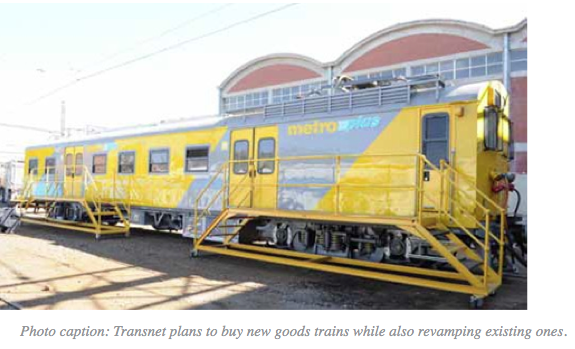 All that is about to change following Transnet’s announcement that it intends to buy slick new goods trains and refurbish existing ones.
All that is about to change following Transnet’s announcement that it intends to buy slick new goods trains and refurbish existing ones.
To reverse the rail to road migration, Transnet has expanded its capital expenditure budget from R110 billion over fi years to R300 billion over seven years. The first batch of locomotives will be delivered to Transnet Freight Rail (TFR) by December 2013, while the last batch is expected to be delivered in September 2014.
The incidental costs to the economy of using roads instead of rail to transport goods, called road externalities, are estimated to be R34 billion per year.
Locomotives from China
Recently Public Enterprises Minister Malusi Gigaba announced the winning bidder of Transnet’s two large tenders for the procurement of 95 electric trains for its general freight business (GFB).
“We are here to announce the procurement of 95 electric locomotives from China South Rail (CSR) Zhuzhou Electric Locomotive and Basadi Matsetse.
“This tender required the suppliers to meet a minimum of a 60 per cent localisation threshold to qualify,” he said.
Minister Gigaba said rail, through its implicit economies of scale, had key advantages over road for the movement of large volume and heavy goods in that it decreased road congestion and road damages, while increasing road safety.
He said the rapid move from rail to road was a natural response to the removal of restrictive regulations which required special permits for bulk freight on the road.
“The rail system remains a core element of building a globally competitive logistics system to support global trade. It also has less environmentally negative externalities and produces significantly less carbon emissions,” he said.
Local production
It was critical to improve the quality of rail infrastructure and associated operating equipment, which will invariably contribute to improving the performance and reliability of rail, he added.
The parties committed to produce the majority of the locomotives locally. However, the fi 10 locomotives will be assembled in CSR’s factories in China, while the remainder will be made in South Africa. This is in line with the agreed supplier development targets of 60.5 per cent of the total value of the contract. The locomotives come with a 30-month warranty and a six-year warranty on the traction motors.
Transnet Group Chief Executive Officer Brian Molefe said the purchase was part of Transnet’s long-term fleet renewal programme to increase capacity, while at the same time improving the average age of its fleet.
He said this was aimed at delivering on the requirements of the Market Demand Strategy (MDS). In terms of the MDS, TFR is expected to grow its volumes from the 201 million tonnes per year to over 350 million tonnes in just seven years.
Energy efficient
The new locomotives, said Molefe, “are more energy efficient as they use less power on TFR’s DC drive technology; capable of re-generating back to the power grid or for own re-use; longer maintenance cycles of 90 to 120 days compared to the current 36 to 60 days as well as better design for driver comfort.
“In addition to the 95 locomotives which was accelerated due to urgent requirements and had already gone through the governance processes, Transnet has invited additional proposals for the supply of 1064 locomotives (465 diesel and 599 electric locomotives),” he said. These are to meet and maintain the MDS volumes targets in line with the company’s R300 billion seven-year investment programme
Build programme turns SA into a construction site
Build programme turns SA into a construction site sadminInfrastructure development
Government will soon roll out a massive infrastructure programme estimated to cost more than R4 trillion over the next 15 years.
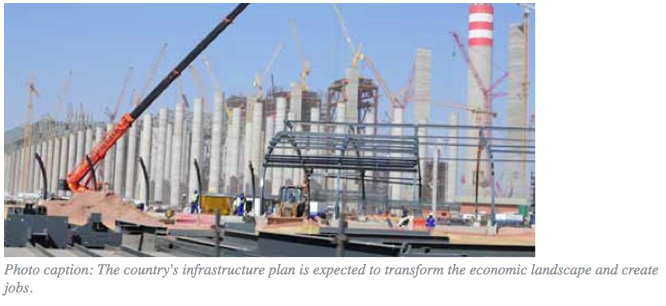 President Jacob Zuma recently invited the private sector to invest in the country’s infrastrucure plan that is intended to transform South Africa's economic landscape and create a significant number of new jobs, while strengthening the delivery of basic services.
President Jacob Zuma recently invited the private sector to invest in the country’s infrastrucure plan that is intended to transform South Africa's economic landscape and create a significant number of new jobs, while strengthening the delivery of basic services.
“This year we decided to single out infra- structure for special focus … our view is that infrastructure development is a catalyst to sustainable economic development and to the improvement of the quality of life of our people in a most fundamental way,” said President Zuma during an Infrastructure Development Summit recently.
Business leaders
Business leaders from different sectors of the economy attended the summit, as they were identified as crucial stakeholders to forge partnerships with government to enhance the implementation of the country’s long-term National Infrastructure Plan. The conference was organised by the Presidential Infrastructure Coordinating Commission (PICC) - a body established to coordinate the long term infrastructure build programmes.
The Infrastructure Plan is expected to guide the construction of new infrastructure, while speeding up current projects that support economic growth. It proposes 18 strategic integrated projects (SIPs) covering rail, road and ports, dams, irrigation systems, sanitation and energy.
Government will contribute R844 billion of the R1.3 trillion needed for the projects in the short term. About R4 trillion is expected to be spent over the next 15 years. Director-General in the Presidency Dr Cassius Lubisi told Vuk’uzenzele that some of South Africa’s infrastructure was old and could not support economic growth.
“For instance in rail, we have begun a process of saying let us replace our trains because of their age and we will do this where necessary.” Lubisi said government needed to do things differently to address infrastructure shortages. “Clearly you do require to fast track the way in which decision making occurs with regard to infrastructure building. Otherwise if we do it in the old, slow sense, we won’t go as fast as we wish to,” he said.
Schools
The 18 SIPs will make it easy for authorities to identify where interventions are needed, he added.
Under SIP 13, for example, government wants to speed up the building of new schools in line with the Accelerated School Infrastructure Delivery Initiative (ASIDI). The ASIDI aims to supplement provincial school infrastructure programmes, as well as eradicate all mud schools.
About 190 schools were provided with electricity, 237 schools with sanitation and 173 schools with water. The construction value is approximately R675 million. In the 2012/13 to 2013/14 financial years the ASIDI aims to replace 100 inappropriate schools with new schools, provide 714 schools with electricity, 514 schools with sanitation and 1069 schools with water.
Rural Development and Land Reform Minister Gugile Nkwinti said the PICC undertook an exercise to identify infrastructure gaps in South Africa and started identifying the 18 SIPS as part of addressing this shortage.
Water needs
“Each SIP will speak to each sector of the economy be it in road transport, rail, education or health and ... all of this should lead to development and job creation,” Nkwinti said at the conference.
Work has already started on some of the projects while others are still at the planning stage. Those already approved include the expansion of the Port of Ngqura in Port Elizabeth, the Dube Trade Port in Durban and the Lesotho Highlands Water Project - a bulk water supply agreement between South Africa and Lesotho. The project is Africa's largest water transfer project and the largest ongoing bi-national construction project on the continent. It is aimed at addressing Gauteng’s water needs since this rapidly expanding province needs more water than its main source, the Vaal River, can provide.
Coal and platinum
In Mpumalanga and Limpopo the focus will be on mining which will include coal, platinum and other minerals for local use, as well as export.
An additional rail capacity will shift coal from road to rail in Mpumalanga with positive environmental and social benefits.
Investment opportunities were identified in the North West and they cut across roads, rail, bulk water, water treatment and transmission infrastructure. Government believes this will result in reliable supply, meet basic social needs and facilitate the further development of mining, agricultural activities and tourism opportunities.
TB-busters tackle the drug resistant challenge
TB-busters tackle the drug resistant challenge sadminResearchers from the Council for Scientific and Industrial Research (CSIR) are making a name for themselves as TB-busters. As tuberculosis (TB) develops a new, drug resistant strain, the scientists are finding ways to contain it.
 The World Health Organisation ranks South Africa as one of the highest-burden TB countries in the world. For people who are HIV positive TB poses an even greater risk as it accelerates the progression of HIV to AIDS. One of the challenges government faces in tackling TB is that current TB drugs often fail. This is because patients find it difficult to comply with the treatment regime, having to take a daily cocktail of medication for six to nine months. For various reasons many patients don’t comply with the treatment regimen, giving rise to drug-resistant TB.
The World Health Organisation ranks South Africa as one of the highest-burden TB countries in the world. For people who are HIV positive TB poses an even greater risk as it accelerates the progression of HIV to AIDS. One of the challenges government faces in tackling TB is that current TB drugs often fail. This is because patients find it difficult to comply with the treatment regime, having to take a daily cocktail of medication for six to nine months. For various reasons many patients don’t comply with the treatment regimen, giving rise to drug-resistant TB.
Cutting-edge technology
Another challenge is the lack of appropriate treatment facilities for TB patients who are multi-drug resistant and who often require long-term treatment. In recent years, the CSIR has made great strides in addressing both of these challenges.
Using cutting-edge technology, CSIR scientists have found a way to improve the TB regimen in several ways. The TB drugs are encapsulated using nanotechnology – a technology that involves the manipulation of matter at the molecular level.
Dr Hulda Swai, a principal scientist at the CSIR, notes, “We believe that nanomedicine-based drug delivery will reduce the dose frequency from daily intake to once a week and could reduce the treatment time from six months to two months.”
Importantly, the new formulation may help reduce side effects such as nausea. These factors will greatly encourage TB patients to complete their course of medication, Dr Swai explains.
New formula
The standard TB treatment targets all lung tissue (healthy and infected), which, while eventually eliminating the TB bacteria, can also cause respiratory tissue damage. The medication delivered via the new formulation will only target the lung tissue infected by the TB. In ongoing research the CSIR found two new compounds inhibiting central TB enzymes, which could be the basis for new treatments. The CSIR also produced new TB detection molecules that will make it possible to diagnose TB simply, rapidly and without cumbersome laboratory tests.
TB is an airborne disease, which makes it particularly difficult for clinics and hospitals to contain while providing the best possible medical treatment for people with multi-drug resistant TB. The CSIR has played a critical role in the design and construction of dedicated long-term accommodation units for such patients.
Natural ventilation
The units have several design features aimed at minimising infection and promoting the recovery and well-being of the patients. One such feature is the use of natural ventilation in all patient areas to achieve a target of 12-16 air changes per hour.
The CSIR used computers to model the flow of air inwards and the buildings were engineered around these results.
The design provides for spaces where patients can participate in recreational and creative activities. During the building of new wards at Modimolle Hospital in Limpopo patients were involved by making mosaics – some of which were incorporated into the courtyards and gardens.
“This is a new skill patients are able to take home with them on their return to communities,” notes CSIR research group leader Peta de Jager.
As post-acute patients spend much of their time outdoors, the design provides space for sporting activity. The design also provides for physiotherapy facilities, visitor areas and classrooms for school-going patients.
*Adrian Di Lollo works for the CSIR.
Beating HIV and Aids
Beating HIV and Aids sadminA year after adopting the National Strategic Plan for HIV and Aids 2012 to 2016, South Africa has made great strides in its efforts to combat HIV and Aids.
Ov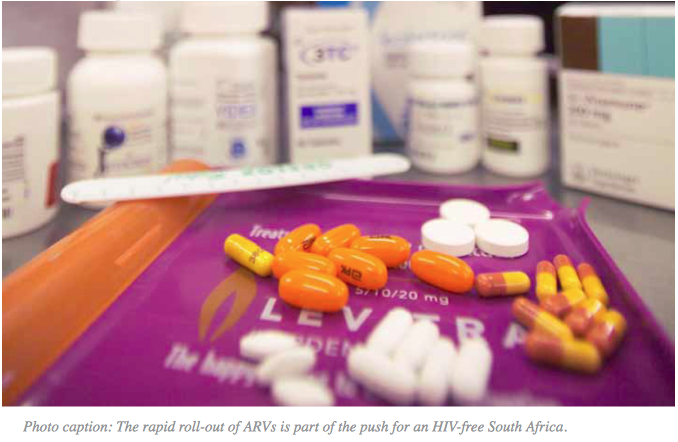 er the past financial year, the number of new patients placed on ARVs has increased drastically to 617 147, compared to the 418 677 who were on ARV treatment in 2010/11.
er the past financial year, the number of new patients placed on ARVs has increased drastically to 617 147, compared to the 418 677 who were on ARV treatment in 2010/11.
The number of people on HIV and Aids treatment stands at 1.7 million and it’s growing. Mother-to-child infection rates have also reduced from around 10 per cent to 3.5 per cent nation- ally and some 20 million people who have been tested now know their status. The driving force behind the NSP for the next five years is its global theme, “Getting to Zero: Zero New Infections, Zero Discrimination, Zero Aids-related Deaths”.
This theme focuses on universal access to treatment.
The Department of Health has been working tirelessly to uphold its commitment to the long- term vision of zero new HIV and TB infections through these projects.
For the long term though, the search is still on for a vaccine to treat HIV and Aids.
Discovery
Recently the Centre for the Aids Programme of Research in South Africa announced the discovery of a unique feature of HIV that enables infected people to make antibodies that are able to kill a wide range of the HIV strains.
This finding provides an important new approach that could prove useful in making an Aids vaccine. However, it will be some time before a vaccine can be produced. Responsible behaviour is the key weapon against HIV and Aids.
Male circumcision
Earlier this year Health Minister Aaron Motsoaledi announced that the department had set a target of 600 000 male circumcisions to be performed by the end of 2012. Circumcised men have less chance of contracting or spreading HIV than uncircumcised men.
“We are near reaching our target, thanks to KwaZulu-Natal who has overtaken every other province with the most circumcisions performed,” said Minister Motsoaledi.
This World Aids Day, which is commemorated on 1 December, join government and take the zero challenge. Get tested and promote an HIV-free society.
Millions injected to train chartered accountants
Millions injected to train chartered accountants sadminSouth Africa faces a shortage of more than 5 000 chartered accountants and government has the huge task of trying to fill the more than 40 perent vacant posts in the fi profession. To tackle this problem head-on, the Department of Higher Education and Training (DHET) will, over the next four years, inject a whopping R84 million into the accounting department of the Walter Sisulu University in the Eastern Cape.
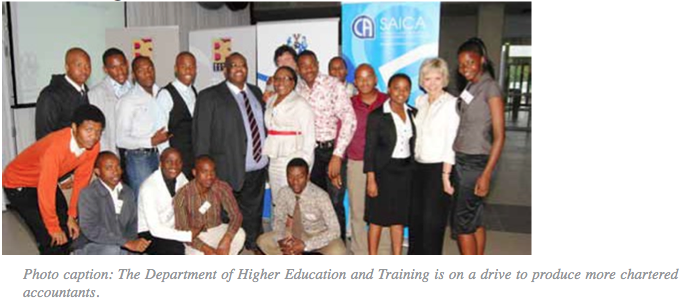 A further R64 million will be allocated to the University of Zululand by the Banking Sector Education and Training Authority (Bankseta) through its National Skills Fund. These investments will go towards getting the two universities accredited by the South African Institute of Chartered Accountants (SAICA), said Minister of Higher Education and Training Dr Blade Nzimande. This will allow them to offer the Bachelor of Commerce Accounting degree and maintain teaching and learning standards that meet the demands of the chartered accountancy profession.
A further R64 million will be allocated to the University of Zululand by the Banking Sector Education and Training Authority (Bankseta) through its National Skills Fund. These investments will go towards getting the two universities accredited by the South African Institute of Chartered Accountants (SAICA), said Minister of Higher Education and Training Dr Blade Nzimande. This will allow them to offer the Bachelor of Commerce Accounting degree and maintain teaching and learning standards that meet the demands of the chartered accountancy profession.
Re-accreditation
The initiative has been made possible through a partnership with SAICA, the University of Cape Town and other industry partners. SAICA will provide administrative support, while the University of Cape Town will provide academic support to ensure the universities get re-accredited.
“It is very encouraging that the re-accreditation of these universities is happening within a context where there is an insufficient number of black chartered accountants in South Africa,” added Minister Nzimande.
“For us to reach communities such as Empangeni in KwaZulu-Natal is a fulfilling exercise as it assists us to widely build a case for skills development in the communities that really need empowering,” said Bankseta CEO Max Makhubalo.
To date the DHET has invested more than R320 million through the National Skills Fund to improve and grow the accounting profession.
“It is even more exciting that this trans- formative programme was launched at one of our rural universities because there is a real need to reach more rural learners than the two currently accredited universities can reach, as that will greatly improve particularly the number of African chartered accountants, which currently stands at just under 2 500,” Makhubalo said.
Facts
Of the 34 418 chartered accountants in South Africa, only 1 100 are African female and 1 339 African male; 468 are coloured female with 478 coloured males; 1 347 are Indian female with 1 936 Indian male; and 7 768 are white female with 19 852 white males.
Other universities that have been accredited through a joint partnership between the department and SAICA are Fort Hare and Limpopo.
Through these projects students will be able to earn high-quality undergraduate degrees with international recognition, while the economy will gain a new breed of chartered accountants who will make a difference in their communities.
Youngsters learn to put road safety first
Youngsters learn to put road safety first sadminYou should not wear dark clothes when walking on the road at night,” the actor said. “Why not?”, responded the young man with a puzzled look on his face. “Because we are losing friends, brothers andsisters daily due to road accidents,” the actor replied.
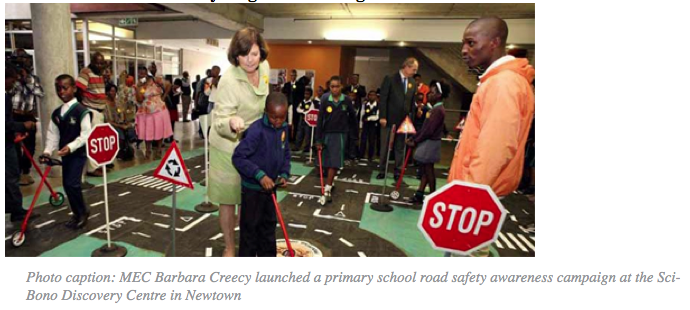 This was not a play at the Market Theatre, but a sketch by learners at the launch of a road safety awareness campaign for primary school learners in Gauteng at the Sci-Bono Discovery Centre in Newtown, Johannesburg, recently.
This was not a play at the Market Theatre, but a sketch by learners at the launch of a road safety awareness campaign for primary school learners in Gauteng at the Sci-Bono Discovery Centre in Newtown, Johannesburg, recently.
Fewer deaths
The campaign is the work of the Gauteng Department of Education (GDE), the Gauteng Department of Community Safety, the City of Joburg’s Transport Department, 3M (a protective gear company) and the Sci-Bono Discovery Centre.
The programme, which will run at Sci-Bono daily and schools throughout Gauteng, is expected to reduce the number of fatalities on the roads by teaching learners to understand and obey the rules of the road through interactive and practical programmes.
Gauteng MEC for Education, Barbara Creecy, said although the GDE had done a lot to ensure the safety of learners through fencing of the schools and the introduction of safety patrollers, it was also vital to extend safety outside school premises.
Safer taxis
“We are very concerned about the number of children who are injured or killed on their way to schools. Statistics show that an alarming 65 per cent of people killed on the roads are pedestrians. Half of these road fatalities are children under the age of 15.
With this programme, we hope to reduce these numbers,” Creecy said.
She added that the department was also working tirelessly to make sure that scholar transport taxis were dropping children off at safe places.
With the programme, learners are involved in fun activities such as a road safety drama called Qaphela. It entails a facilitated session on a road safety mat, as well as other exciting and educational activities related to road safety.
*Melitah Madiba and Khanya Sigcau work for Gauteng Office of the Premier.
School health programme widely welcomed
School health programme widely welcomed sadminGovernment’s introduction of health services at schools that will protect learners from unhealthy diets and HIV, among others, has been praised by a range of organisations in the education community.
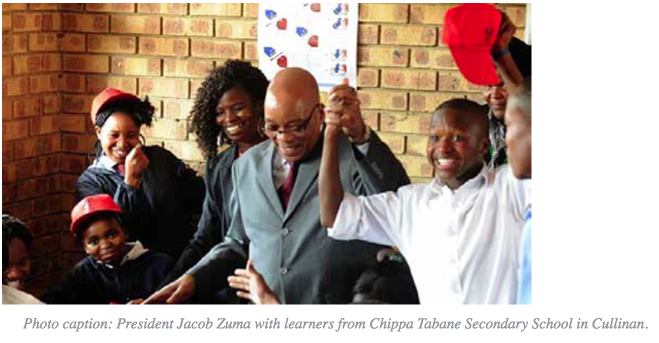 Launched recently by President Jacob Zuma, the Integrated School Health Programme (ISHP) brings health services to learners in some of the country's neediest schools. It also deals with the problem of unhealthy diets and lifestyles; promotes child mental health wellness and ad- dresses the high rate of teenage pregnancies, as well as the need to stem the spread of HIV.
Launched recently by President Jacob Zuma, the Integrated School Health Programme (ISHP) brings health services to learners in some of the country's neediest schools. It also deals with the problem of unhealthy diets and lifestyles; promotes child mental health wellness and ad- dresses the high rate of teenage pregnancies, as well as the need to stem the spread of HIV.
Quality health services
Speaking at the launch, President Zuma pointed out that only 16 per cent of the population were currently on medical aid. Government sought to extend quality health services, particularly at school level, by introducing the ISHP, which is in line with the World Health Organisation's call for universal health coverage around the world, regardless of people's economic status.
The programme has been widely welcomed. "We are pleased about the wide scope of services that will be provided at schools, as many learners are burdened by conditions, which if detected and treated at an early stage could easily be brought under control," said General Secretary of the National Professional Teachers' Organisation of South Africa Henry Hendricks. National Teachers Union (NATU) Executive Director Allan Thompson agreed.
"NATU pledges full support and commitment to ensure that the programme becomes a success and is also extended to the general public by en- suring that schools are used as centres for public health and education, especially to those who are far from the clinics and hospitals," he said.
The early years
Professional Teachers Union's General Secretary, Ben Machipi, said childhood development was crucial in the formative stages up to six years of age.
"The fact that the programme starts with Early Childhood Development in schools and those who are not in schools, is encouraging," Machipi said.
South African Democratic Teachers Union General Secretary, Mugwena Maluleke, said through its members at all levels, the union would always be available to offer any form of assistance in terms of the roll-out.
"We welcome this initiative, particularly the fact that the most vulnerable of learners ... will be targeted," he said.
The National Association of School Governing Bodies’ General Secretary, Matakanye Matakanye, said: "This move demonstrates an improvement in the capacity of the state to deliver services efficiently and effectively by moving more towards an inter-departmental collaborative effort."
Health promotion
The Secretary-General of the National Congress of School Governing Bodies, Monokoane Hlobo, added: "We are happy that this programme will cover the barriers to learning, information and counselling onsite service provision, health promotion and the environmental assessment of schools."
While noting that the challenge would be putting the plan into action, the Federation of Governing Bodies of South African Schools believed that the programme was a step in the right direction.
The South African Principals' Association also pledged its support for the programme, noting that school communities and society would become more conscious of matters relating to children's health and well-being.
Training villagers to craft their own income
Training villagers to craft their own income sadminUntil 2010, Nomfazwe Cwanyiswa was an unemployed, unskilled mother of 13, who lived in poverty in one of the many impoverished and underdeveloped areas of the Eastern Cape.
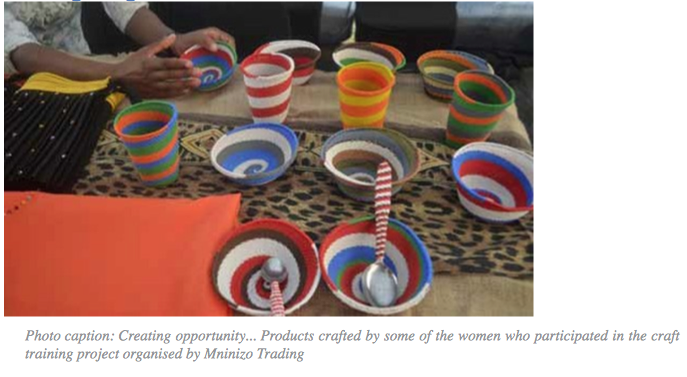 But Cwanyiswa’s life changed after she completed a training course in arts and crafts with Mninizo Trading in the Mhlontlo Local Municipality. She now uses skills to generate an income to support her family.
But Cwanyiswa’s life changed after she completed a training course in arts and crafts with Mninizo Trading in the Mhlontlo Local Municipality. She now uses skills to generate an income to support her family.
Cwanyiswa is one of the many beneficiaries of the arts and craft training project run by Mninizo Trading, which is owned by Robert Sibisi and his wife Nomusa.
Poverty relief
During the past 10 years the company has pro- vided more than 1 000 unemployed villagers with opportunities for self-employment. The project is funded by the Department of Rural Development and Land Reform.
It has trained 870 people in KwaZulu-Natal, the Eastern Cape, Mpumalanga and Limpopo, specifically in Comprehensive Rural Development Programme (CRDP) sites, such as Msinga, Mhlontlo, Mkhondo and Muyexe.
Apart from developing skills, the training has also created direct job opportunities for some participants who were selected to become trainers. They were paid R300 a day for the 10-day training programme.
In his 2011 Budget Speech in Parliament, Minister of Rural Development and Land Reform Gugile Nkwinti noted the impact of Nomusa Sibisi’s project on poverty relief. “She has been training rural and small-town people in craft across the country, with the department paying for her travelling costs, accommodation and training materials,” Minister Nkwinti said, noting that the strength of the programme was that she did not train people without a market for their products.
Youth with disabilities
The department plans to contract her to train participants in the National Rural Youth Service Corps, especially youth with disabilities to help them acquire skills to start their own craft-related enterprises.
The training includes the use of different materials such as beads, discarded telephone wire strings and ilala palm leaves for weaving. The training also addresses other aspects of running a business such as customer care, pricing and costing, sales recording and stock control.
Products generated from the training courses have been well received at exhibitions at the African Image in Cape Town, the Gateway Theatre of Shopping in Durban and the Rand Easter Show in Johannesburg. Owing to their high quality, many of the items are sold in various curio shops and shops at national parks.
For more information call the Department of Rural Development and Land Reform at tel. 012 312 9300.
New funding hope for “unbankable” farmers
New funding hope for “unbankable” farmers sadminThere is hope for emerging farmers in the Eastern Cape who have been turned down by mainstream financial institutions.
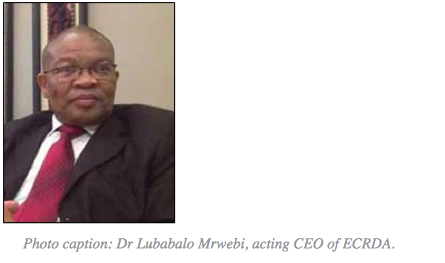 Following the establishment of the Eastern Cape Rural Development Agency (ECRDA), they now have a reasonable chance of getting loans at lower interest rates.
Following the establishment of the Eastern Cape Rural Development Agency (ECRDA), they now have a reasonable chance of getting loans at lower interest rates.
The agency’s main responsibility is to fund farmers who have been rejected by main- stream financial institutions such as banks.
The agency was formed following the merger of two funding bodies, the Eastern Cape Rural Finance Corporation and Accelerated Growth Initiative for South Africa-Eastern Cape.
“As part of the consolidation of the fragmented work of the previous agencies, the ECRDA continues to provide credit finance, especially to those who are considered unbankable by the conventional banking institutions,” said the agency's acting CEO Dr Lubabalo Mrwebi.
Interest rates
Potential clients who approach the agency will enjoy the lowest interest rates. “Requirements for collateral have been relaxed and preference is now given to livestock as a form of security,” he added.
Women and youth are given special preference.
Since its establishment, the ECRDA has been the vehicle of choice for the Eastern Cape Department of Rural Development and Agrarian Reform in facilitating the implementation of rural development initiatives.
“It manages a budget of R155 million for the current financial year. It is there to implement high-impact priority projects for the department. To this end, in its portfolio it has various divisions that fall under it,” explained Dr Mrwebi.
Divisions of the agency:
- Kangela Development Trust based in Kirkwood. The trust produces citrus and deciduous fruit for processing for local and export markets.
- Agrarian Research and Development Agency. This agency seeks to establish a bio-ethanol plant in Cradock. Its products are sugar beet and sorghum and it has the potential to create direct and indirect jobs.
- Magwa Tea Estate situated in Lusikisiki. The estate produces tea sought after by leading tea processors. The estate employs more than 2 000 permanent employees who are sustaining more than 10 000 people in the immediate vicinity.
The ECRDA has an executive board of directors which is the accounting authority of the agency. The board is appointed by the department and has a staff complement of 144.
The agency coordinates a R38 million crop- ping project on behalf of the department for the current growing season. The major crop is maize with an estimated return of four tons per hectare. It is expected to contribute to food security and the establishment of agro- processing units across the province.
Agriculture is a key job driver
Agriculture is a key job driver sadminThe agricultural sector is a key component of the economy and plays a crucial role in government’s efforts to drive and promote food security and economic growth, said President Jacob Zuma recently.
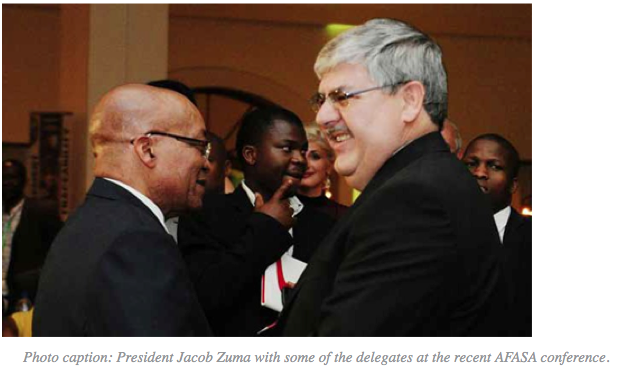 Speaking at the first annual general meeting of the African Farmers’ Association of South Africa (AFASA) held in Pretoria, the President added, “Agriculture is a crucial sector and is one of the six job drivers identified in the New Growth Path”.
Speaking at the first annual general meeting of the African Farmers’ Association of South Africa (AFASA) held in Pretoria, the President added, “Agriculture is a crucial sector and is one of the six job drivers identified in the New Growth Path”.
AFASA is a representative and unitary body of African farmers, committed to driving the establishment of competent and successful commercial African farmers in South Africa.
High food prices
President Zuma said AFASA’s meeting was taking place at a time when South Africa and the international community were battling the threat of high food prices.
“Our people are feeling the effects of the changing international economic climate. A basket of goods is much more expensive compared to what was paid for it a few years ago. The poor and the working class are adversely affected by this state of affairs.”
He noted that government’s proposed new approach to land reform, which is contained in the National Development Plan, would need the support of the farming community to be successful.
The plan includes a district-based approach to land reform and its financing.
This will see government buying land at 50 per cent of its market value from farmers who are under extreme financial pressure, land held by absentee landlords willing to exit and land in deceased estates.
Reversing imbalances
Minister of Rural Development and Land Reform Gugile Nkwinti said government would work with the association to reverse the imbalances of the past.
“The democratic state inherited a colonial apartheid economy based on racial capitalism. This must change radically to reflect the country’s demographics. We are compelled to execute change within our framework, which provides for a just and equitable principle in the public interest,” he said.
“We must grow our economy to create a solid platform for combating poverty, unemployment and income inequality which are nothing but a symptom or manifestation of underdevelopment in certain areas of our society brought about by the racial structure of economy.”
He added that the biggest challenge South Africa was facing was how to reverse the legacy of the 1913 Native Land Act.
“If we are to reverse this legacy comprehensively we must not only think about land changing hands between black and white. We must also think about how we reverse the devastation of the environment, as a result of over-population and over-grazing,” he added.
Ho, ho, ho! The silly season’s here!
Ho, ho, ho! The silly season’s here! sadminThe silly season is upon us and South African cities are buzzing with a feast of popular, cultural and arts events from drama to comedy, jazz and dance, arts and crafts to carnivals.
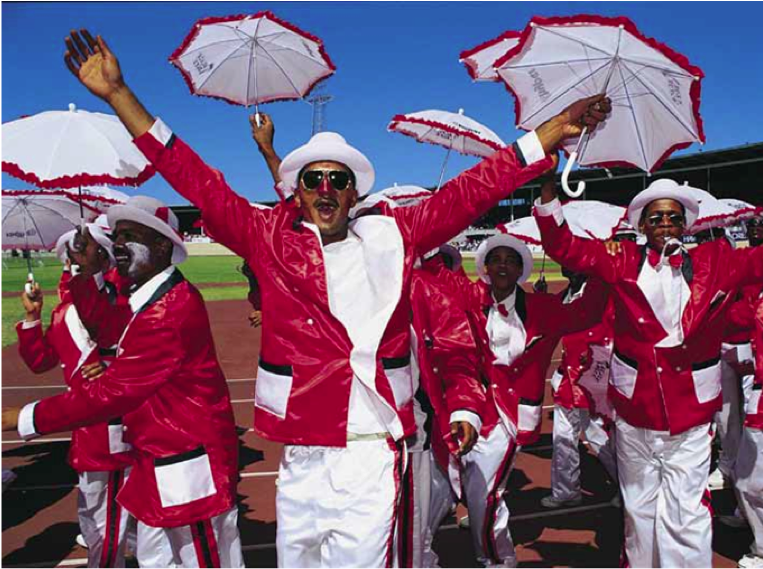 Residents of Johannesburg, Tshwane, eThekwini and Cape Town will be spoilt for choice as these urban centres prepare for thrills that will bring cheer to locals and visitors alike.
Residents of Johannesburg, Tshwane, eThekwini and Cape Town will be spoilt for choice as these urban centres prepare for thrills that will bring cheer to locals and visitors alike.
Make your pick from the following:
City of Johannesburg
Joburg attractions include:
- Christmas lunch for the elderly during the first and second weeks of December
- Every Child’s Birthday Lunch during the first and second weeks of December
- The Joburg Carnival on 31 December
- New Year's Eve Concert on 31 December
- Sansui Summer Cup at the end of November to early December.
For more information call the City of Johannesburg Call Centre on 0860 562 874.
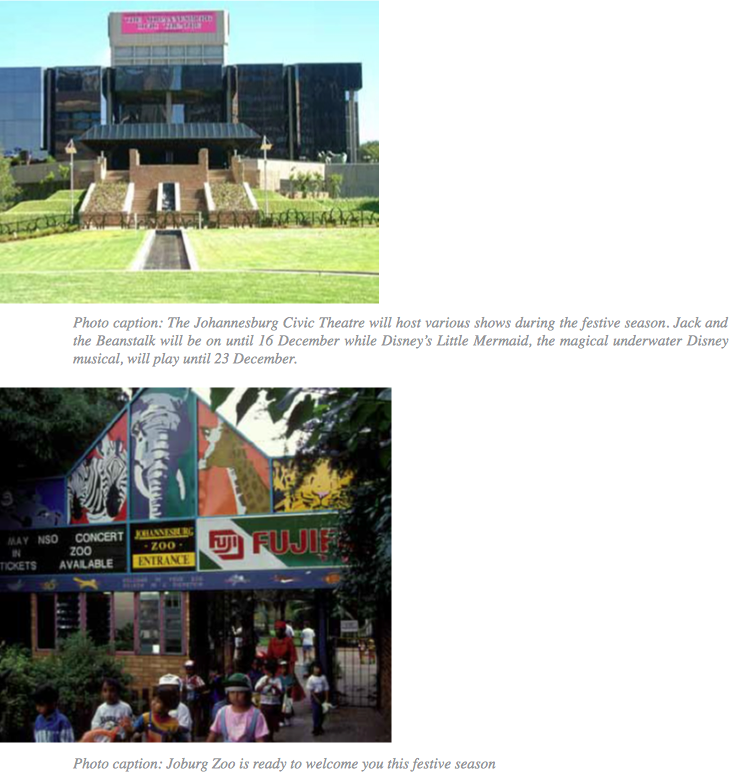 What’s on at the zoo?
What’s on at the zoo?
- A holiday programme with a touch of wildlife from 10 to 21 December. Entrance is R150 for adults and R65 for children.
- At the Zoo Trot you can run or walk 5 or 10km every second Sunday of the month. Entrance is R40.
- The Wild Lights at the zoo will see Christmas lights shaped like animals going up from 15 to 24 December. The zoo opens daily from 8:30am to 5pm and the last entry is at 4:30pm. Entrance is R58 for adults, while children and pensioners pay R36.
For more information call the Johannesburg Zoo on 011 646 2000.
Joburg theatre
It’s panto time at the Joburg Theatre as Jack and the Beanstalk takes to the stage. The show will be on until 16 December. Disney’s Little Mermaid, the magical underwater Disney musical, is on until 23 December.
SA State Theatre
Not to be outdone, the City of Tshwane will come alive as the Mzansi Fela Festival makes its way to the State Theatre.
The festival is a celebration of South Africa’s amazing talent in the performing arts. It is also an opportunity to uncover new actors and directors through the highly successful fieldwork programme.
Prepare to be serenaded by Zahara on 1 December, Sibongile Khumalo on the 7th, Parlotones on the 8th, and Lira on the 14th and 15th.
There will be comedy, jazz, theatre and dance galore.
There will also be shows from jazz and African music legends such as Selaelo Selota, Ngwako Manamela, Ladies in Jazz, Steve Dyer, Gcobisa and Four Seasons.
These will take place in Kilnerton on 9 December.
The Rendezvous Theatre will play host to some of the country’s freshest comedy performers such as Kedibone Mulaudzi, Toll Ass Mo, Judy Jake, Deep Fried Man and Mel Miller on 8 December.
A total of 13 productions have been chosen for the programme in 2012, showcasing the talent of young up-and-coming players in the South African arts scene.
Tickets for the productions can be purchased at Computicket and cost R30 for the public and R10 for community groups.
For more information call the South African State Theatre on 012 392 4000.
Pretoria Zoo
Get up close with nature at the Pretoria Zoo. From 10 December to the middle of February the zoo will offer holiday courses on monkey tricks, amazing reptiles and bird identification. The zoo will be open throughout the festive season.
For more information call the Pretoria Zoo on 012 339 2700.
Ethekwini Municipality
For fun-seekers heading for the coast, Durban will offer a lot of fun in the sun.
The Umhlanga Summer Carnival takes place in the coveted coastal resort of Umhlanga, north of Durban from 8 to 23 December.
The two-week carnival kicks off with the Summer Surf Session organised by the KwaZulu-Natal Surfing Association, which takes place from 8 to 10 December with well- known local surfers vying for the winning spot.
The Royal National Yacht Club Umhlanga Rocks Festival takes place on 15 and 16 December.
The oldest yacht club in Africa will be racing off shore of Umhlanga pier for the duration of the long weekend, creating a colourful backdrop for beach visitors.
For the more active and adventurous, the Umhlanga Summer Carnival 16km Trail Run takes place on 16 December.
Grab your trainers and gear up to trail through the Umhlanga coastal area for an invigorating sunrise outing starting at 6am from the Umhlanga Sands Resort. Entry forms are available from Umhlanga Tourism.
For more information call 031 312 1281 or visit www.umhlangatourism.co.za.
Nelson Mandela Metro
In the Eastern Cape, Port Elizabeth promises to be the centre of holiday fun as it plays host to the seventh Christmas @ Hopefield Country House Music Festival on 9 December at the Hopefield Country House from 3.30pm. This promises to be an afternoon of beautiful music in a country atmosphere.
The city will also host the HSBC Sevens Rugby Tournament at the Nelson Mandela Bay Stadium from 8 to 9 December.
For more information call the Nelson Mandela Metro on 041 506 5555.
City of Cape Town
The Mother City will be a holiday city throughout the festive season, hosting revellers from around the world.
But the highlight of the festivities promises to be the annual Cape Town Minstrels, which will bring in 2013 with a hip-swinging, foot- stomping, show-stopping New Year's carnival. According to chairperson of the Cape Town Minstrels Association Richard Stemmet all preparations are well on track and they are waiting for the day to arrive.
“Things have gone well in terms of preparation and we are ready to roll,” he said.
On 1 January all the teams will participate in the Minstrel Competition at the Athlone Stadium.
The competition will take place every Saturday until the middle of February. Each team will do 17 items.
“We also have the 2nd of January Street Parade in the heart of Cape Town where more than 100 000 spectators will line the streets to watch the minstrels do their thing. This march commemorates the freeing of the slaves,” he explained.
For more information on the Minstrels call: 021 761 5239.
How's business? dti checks up
How's business? dti checks up sadminCompanies that are receiving funding and assistance from the Department of Trade and Industry (dti) may just be surprised by a visit from the department to monitor and evaluate their work and the progress they are making.
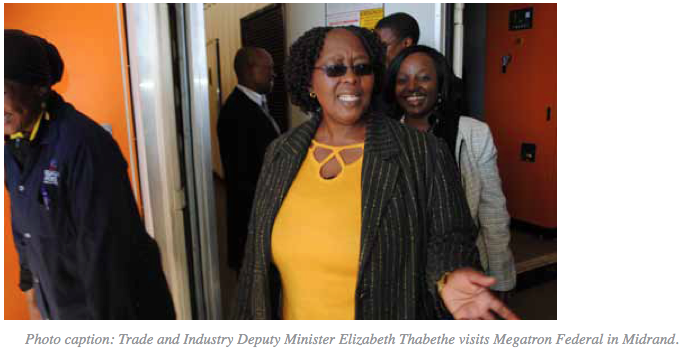 During a recent visit to Megatron Federal in Midrand, Deputy Minister of Trade and Industry Elizabeth Thabethe said monitoring and evaluation was not always easy but was necessary.
During a recent visit to Megatron Federal in Midrand, Deputy Minister of Trade and Industry Elizabeth Thabethe said monitoring and evaluation was not always easy but was necessary.
The department not only supports businesses, but also monitors the progress of the projects it funds and strives for accountability at all times, she said.
Stimulating the market
Megatron Federal is an engineering company that offers a wide range of products and services in the field of power generation, transmission, distribution, construction and telecoms. The company received R10 million worth of funding on two separate hydro- power energy projects in Burundi from the dti’s cost-sharing scheme Capital Projects Feasibility Programme (CPFP).
The funding forms part of the department’s vision to lead projects in and outside South Africa that will increase exports and stimulate the market for South African capital goods and services.
“What I have seen here today reminded me of the fact that South Africa, and Africa as a whole, has the potential of making a mark in the world. I never thought we would have a company this big manufacturing power products like the ones I saw today. I am happy that the dti’s CPFP funded them,” said Thabethe.
The project, which is nearing completion, has an estimated value of US$150 million (R1.3 billion).
Employing women
During the walkabout at the Megatron Federal buildings, Thabethe noted that the company was also serious about employing women. CEO of Megatron Ryan Otto said that women employees tended to pay more attention to detail than their male counterparts.
The deputy minister pointed out that Megatron was also encouraged to assist in identifying a number of small and BEE firms that could supply its manufacturing activities or sub-contract in the implementation of its energy projects. These include the building and commissioning of the hydropower stations and all other energy projects.
The effectiveness of the CPFP as a tool for industrial and economic development will be enhanced by such positive changes and will play a more practical role in the actualisation of the North-South corridor initiative.
Otto emphasised that Megatron Federal was committed to expanding business opportunities into Africa, especially energy-related infrastructure and developing the renewable energy market.
Social responsibility
”Our emphasis is not only on making profits. It is our social responsibility to address the issues of unemployment in South Africa. Our staff complement is currently sitting on 400, with the majority being youth and all are permanent staff, excluding the interns who are also in our system,” said Otto.
He added that Megatron’s empowerment plans included achieving a B-BBEE level four rating within two years; recognising the inherent skills and value of women in business; continuing to support training and skills development of previously disadvantaged individuals; acknowledging the role of small and medium enterprises; and ongoing commitment to enterprise development initiatives.
Qualified electrician Orica Maaka, 34, said she had been with Megatron for four years and was happy in her job. “I don’t like it when men feel pity for me and think that because I am a woman I cannot perform well. But my male colleagues now respect me and know that I am good at my job,” she said.
* Tshilidzi Madinani works for the dti.
For more information on the dti schemes, visit: www.thedti.gov.za/financial_assistance/financial_assistance.jsp
Expo starts new wave of maritime jobs
Expo starts new wave of maritime jobs sadminYoung people looking to start out in life have been encouraged to set out to sea for exciting career opportunities. This was the message at the Careers’ Expo and Jobs Summit hosted by the South African Maritime Safety Authority (SAMSA), the Department of Labour and the KwaZulu-Natal Department of Economic Development and Tourism at the Moses Mabhida Stadium in Durban recently.
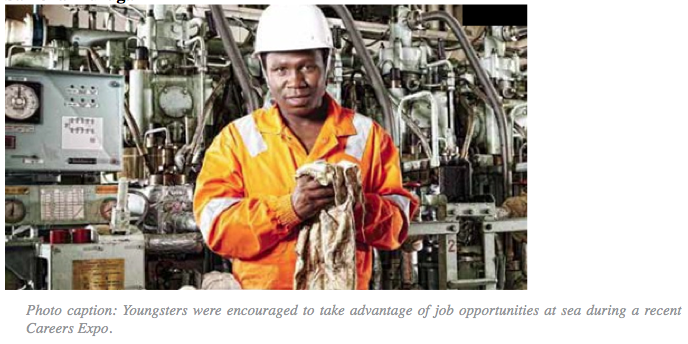 The youngsters were told that there were many jobs at sea including careers in navigation, crew management, cargo stowing, engineering, communications and hotel crew.
The youngsters were told that there were many jobs at sea including careers in navigation, crew management, cargo stowing, engineering, communications and hotel crew.
Jobs on luxury cruise ships or ferries not only provide exciting career paths for young people and a way to support themselves, but also provides them with opportunities to see the world.
Untapped opportunities
The Job Summit was also aimed at reviving the country’s maritime industry and creating 160 000 jobs within the next 20 years. Careers at sea remain largely unknown, said SAMSA CEO Commander Tsietsi Mokhele.
“Up to 98 per cent of trade between South Af- rica and its partner countries is seaborne, yet maritime career opportunities remain largely untapped due to lack of awareness amongst South Africans,” Mokhele added.
In support of its core message that young people “can choose a career less ordinary in the maritime industry,” the event helped inform learners, school leavers, job seekers and educators of opportunities and provided a platform for employers and job seekers to connect.
The event was expected to make a significant contribution to driving skills development and employment in the maritime sector for the youth of South Africa.
SAMSA developed the Maritime Skills Development Programme because of its skills study. To further encourage learners and job seekers to pursue a career within the maritime sector, the SA Agulhas sailed into Durban harbour to fly her colours for the more than 10 000 visitors at the expo.
Inspired and motivated
With informative displays, skills and information sessions, workshops, competitions, water sports activities and even a seafood pavilion, young people left inspired and motivated to join the maritime industry.
“I am extremely pleased that this initiative seeks to make sector skills training and development a national priority, especially in the marine sector, as one of South Africa’s critical economic sectors that has forever experienced a dire skills shortage, yet with an enormous job creation prospect, nation- ally and internationally,” Minister of Higher Education and Training Dr Blade Nzimande said.
He added that although the country had seen some recovery in job creation during 2011, employment had not yet returned to the level it was at and the unemployment rate remains high at over 24 per cent.
“The funds invested in job creation by the country and the predictions of employing 332 000 people as a result thereof is a positive sign that South Africa is moving towards its goal of creating five million jobs by 2020,” he added.
Memorandum of agreement
Minister Nzimande stressed that more rapid job creation was needed and businesses needed to look at the incentives which government offered, which would assist companies in creating employment opportunities while simultaneously benefiting the company.SAMSA also entered into a Memorandum of Agreement with the Department of Higher Education and Training to implement skills development programmes in the maritime sector with support from the National Skills Fund. This initiative will benefit 647 unemployed youth and graduates over a three-year period to the value of R93.6 million.
Among others, the project will focus on cadetship and marine engineering. This project will increase the output of seafarers including unemployed graduates to maritime professions, achieving over 45 000 jobs within the maritime sector over the next eight years.
Interns to shed light on SA’s history
Interns to shed light on SA’s history sadminIntern historians have a golden opportunity to gain skills and shed some light on the history of South Africa as part of the first South African History Online (SAHO) Graduate Development Programme.
The first batch of 10 graduates is already a part of the programme.
Speaking at the launch of the intern programme at the Iziko Museum in Cape Town recently, Minister of Higher Education and Training Blade Nzimande said he hoped many of the interns would go on to become researchers, who will help to shed light on the history of the country and region.
Enhance skills
“I hope the SAHO interns will be able to use their experience to enhance their skills and insights as historians and go on to become teachers of History in our universities, colleges and schools.”
He said a large volume of history was left untold or told from one perspective. South African history had to be rewritten and researched. The minister told the young SAHO interns that they were lucky to work in an area of expertise that they loved.
The programme is a partnership between the Culture, Arts, Tourism, Hospitality and Sports Sector Training Authority and SAHO.
The programme was designed for students to gain work experience in research and for graduates to become familiar with the use of the web as a tool for research. This would contribute to the development of content for the website. Various university departments approached SAHO to place students to acquire skills and work experience by doing archival research.
Online archive
The internship runs for six months and graduates are from universities in the Western Cape. Their responsibilities include researching South African history and building an online archive of documents, images and other audio-visual resources.
They will contribute to the web-design process and digitise documents and visual images for online resources and more.
“This project must not only seek to write his- tory and to reinterpret the past in new exciting and relevant ways. It should also work towards rejuvenating an interest and a love of history in our society,” the minister said.
The economy desperately needs engineers, scientists and those with certain business skills. This, however, did not mean that South African or world history, literature, philosophy and sociology should be neglected, he added.
Minister Nzimande said that his department had announced its intention to establish a National Institute for Humanities and Social Sciences.
It would help fund a number of catalytic research projects, which would stimulate debate and further research.
Celebrating the women who feed the nation
Celebrating the women who feed the nation sadminThe Department of Agriculture, Forestry and Fisheries has set a target of establishing 15 000 smallholder producers, with a particular focus on women in rural areas who have displayed enterprising abilities through the sale of their produce.
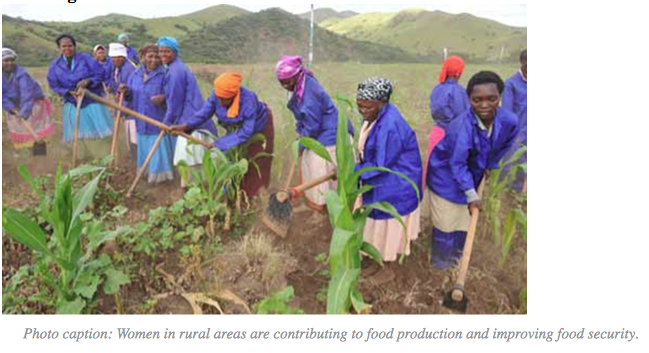 Commemorating International Rural Women’s Day recently, Agriculture, Forestry and Fisheries Minister Tina Joemat-Pettersson urged the nation to celebrate the determination of rural women in their contribution to food production and improving food security to stamp out hunger and rural poverty.
Commemorating International Rural Women’s Day recently, Agriculture, Forestry and Fisheries Minister Tina Joemat-Pettersson urged the nation to celebrate the determination of rural women in their contribution to food production and improving food security to stamp out hunger and rural poverty.
To build on this foundation and to achieve development that has multiple spill-over effects that deepen and expand wealth creation, creating jobs and addressing rural economic development challenges, the department has undertaken multi-stakeholder engagements to link producers with the markets,” she said.
Women at the forefront
International Rural Women’s Day was established by the United Nations General Assembly in recognition of the critical role and contribution of rural women including indigenous women, in enhancing agricultural and rural development, improving food security and eradicating rural poverty.
Minister Joemat-Pettersson said in these tight economic times, rural women were at the forefront of ensuring that their families and communities received a supply of food produced from smallholdings, mostly using indigenous technologies.
She said the department identified employment creation through support for small-holders and processors in agriculture, forestry and fisheries as one of its contributory components in rural and agrarian reform.
“To produce food that is affordable, nutritious and enough for the country, requires supporting policies that are focused on areas of high challenges and at the same time, has the greatest potential. In this regard, a focus on rural communities and especially rural women and further investing in what they have has already started,” she said.
Small-scale fishing
Women in rural areas adopt specific strategies to deal with challenges of food security in these times of high food prices. Women are known to become the buffer for their families in any difficult situation, particularly in times of food pressures, the minister noted.
For communities, particularly women along the rural coastal regions, the Small-Scale Fishing Policy will enable improved livelihoods and food security from the marine resources.
“For this purpose the department recognises that the allocation of rights is only a part of the process. The policy will make it possible for small-scale fi hers to develop and uplift themselves, contributing to the eradication of poverty, ensuring food security and promoting equity without endangering ecological sustainability,” she said.
The minister said a community orientation approach would be followed in ensuring the responsible use of natural resources.
For the marginalised, she said the process would include re-establishing the culture and capability to live through the use of the land and marine resources with strategic linkages to grow and access markets.
“Through support for smallholders and processors, we will be able to evaluate the extent to which our policies have created jobs, food security and sustainable livelihoods,” she said.
Young professionals take a bow
Young professionals take a bow sadminThe Deputy Minister of Public Works, Jeremy Cronin, accompanied by his counterpart from Higher Education and Training, Mduduzi Manana, honoured 14 young professionals who participated in the 2012 Department of Public Works Young Professionals Programme in Pretoria.
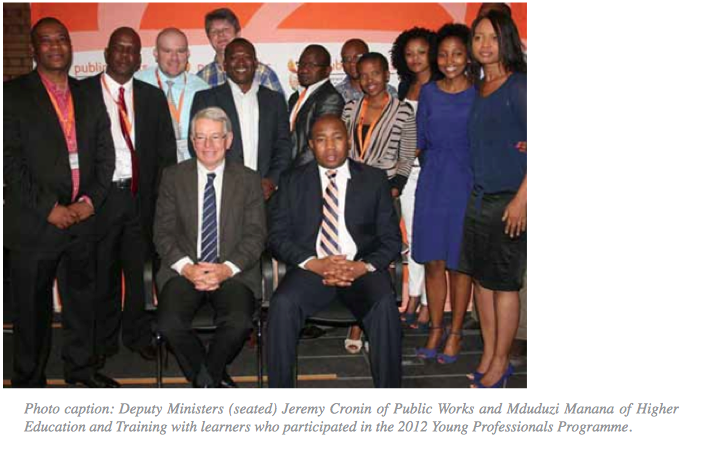 Speaking at the event, Deputy Minister Cronin said the programme was an important initiative of the department, aimed at giving young professionals in the built environment opportunities to enter the job market and contribute to the economy.
Speaking at the event, Deputy Minister Cronin said the programme was an important initiative of the department, aimed at giving young professionals in the built environment opportunities to enter the job market and contribute to the economy.
Fourteen youngsters were absorbed into the programme and placed in various projects of the department with a mentor supervising each of them.
They ranged from quantity surveyors, planners, architects and architectural technologists.
Closing the skills gap
Deputy Minister Cronin added that the programme was aimed at closing the skills gap to help create a healthier economy.
“The Young Professional Programme will help us address the massive skills shortage. We live in a country that has massive inequalities and a high proportion of poverty. We look up to young professionals to undo this reality ... “Also, this initiative contributes to the president’s call to address, train and develop young people in these scarce fields as part of current and future infrastructure developments. You are already helping the department with site clearance. We are currently saving a lot of money because of your contribution,” he said.
After completing the programme, the participants can register with councils in the built environment and get registration numbers that will allow them to start practicing as professionals in various fields in the built environment.
Proud and happy
Edwin Tebeila, 28, from Mamelodi said he was very proud and happy to have participated in the programme.
Before joining the programme he was unemployed for three years even though he completed a degree in Architectural Technology.
“I’m very grateful to the department for coming to us with such an initiative, because I have been sitting at home without a job. Now I’ve got a chance to get a registration number and a job and contribute to the economy,” he said.
After completing the programme, the graduates are absorbed into the various projects by the department or they look for jobs themselves.
Deputy Minister Cronin urged the learners to work closely with the Council for the Built Environment (CBE) in an attempt to improve the programme.
“The CBE needs to work with you and you should all tell us where the bottle necks are and their nature. Together we should build a socially oriented infrastructure programme,” he concluded.
Youth make labs their comfort zone
Youth make labs their comfort zone sadminSouth Africa’s biggest science fair, the Eskom Expo, has once again shown that our youth feel at home in laboratories. After 28 exciting and competitive regional finals countrywide, the grand finale of the Eskom Expo for Young Scientists was held at the Birchwood Hotel and Conference Centre in Johannesburg in October.
 Currently in its 32nd year, the science fair has been a resounding success with 556 projects on display. In addition, learners and educators from countries like Lesotho, Nigeria, Ghana, Kenya and Mexico also participated.
Currently in its 32nd year, the science fair has been a resounding success with 556 projects on display. In addition, learners and educators from countries like Lesotho, Nigeria, Ghana, Kenya and Mexico also participated.
The Eskom Expo, endorsed by the Department of Science and Technology, saw learners from 28 regions across the country discussing their work with professional scientists, judges, educators, learners from other schools, parents and other interested community members. It not only helps learners to increase their knowledge but also raises awareness of the wonders of science.
Winners
This year the overall winners were Sibongakonke Nxumalo and Snenhlanhla Sibiya from Dlangezwa High School in KwaZulu-Natal. The pair of Grade 11s developed a load shedding meter that regulates the supply of electricity in a household when the national power grid is under pressure. When the electricity supply comes under stress, the control unit (which is housed at Eskom power stations) sends a signal to the meter box to switch off everything using over 100 watts of electricity in the house. The user will then have to unplug everything consuming large amounts of electricity and their lights will go back on.
Nxumalo and Sibiya were motivated to in- vent the load shedding meter after electricity cuts interrupted their night study group at school. “We wanted to invent something that would not only help us but also the country because, as you know, we are facing a huge crisis with our electricity supply. We believe this project will help us learners, our com- munity and Eskom to put an end to power cuts,” said Sibiya.
Medals
This year 69 gold medals, 156 silver and 202 bronze medals were handed out to the most outstanding projects. The Eskom Special Awards include the best development project, best energy project, best energy-efficiency project, best female project, and best rural high and primary school projects.
All winners received a laptop and the overall winners walked away with a trip to an international science fair related to their project and fi of interest. Nxumalo and Sibiya also won the Eskom Best Development Project Award and their school will receive a mobile science kit valued at R34 000.
The Eskom Best Energy Efficiency Project Award went to Matthew Keevy and Sonke Mkhabela from Pretoria Boys High School. The Grade 11 learners designed a programme to save the electricity consumed by streetlights and lights on highways using light and movement sensors.
The duo calculated that these sensors could cut energy usage by 42 per cent. “We want to take our project further by presenting our idea and the results of our findings to the City Council and prove that Grade 11s can make a difference in our country. If I win, it will prove that I am capable of becoming an engineer,” said Mkhabela.
The Eskom Best Energy Project Award was won by Tave Verhoef from Howick High School in KwaZulu-Natal for her project entitled “Maglev Train”. She looked at how Maglev trains work using the principle of magnetic polarity.
The Eskom Best Female Project Award went to Grade 7 learner Iselle van den Heever from Fichardtpark Primary School in Bloemfontein. Her project looked at how the planets orbit the sun.
Enterprising spirit
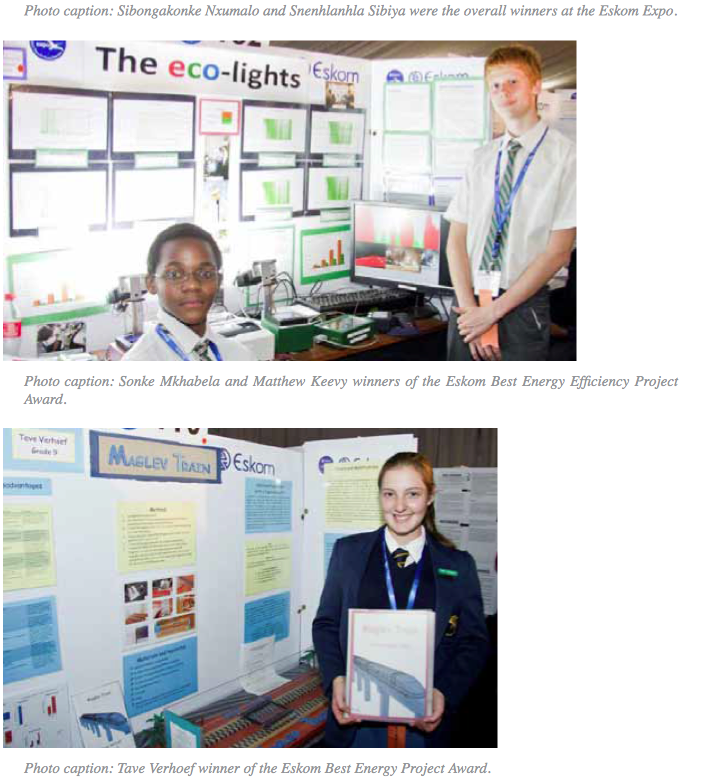 Eskom CEO Brian Dames commended the youth for their enterprising spirit. “For me the Eskom Expo is really about celebrating what’s good in South Africa and it gave me great satisfaction to see these young learners with such energy and enthusiasm. It gives me great hope about the future of our country,” he said.
Eskom CEO Brian Dames commended the youth for their enterprising spirit. “For me the Eskom Expo is really about celebrating what’s good in South Africa and it gave me great satisfaction to see these young learners with such energy and enthusiasm. It gives me great hope about the future of our country,” he said.
Eskom has invested more than R400 million per year in supporting external mathematics, science and technology initiatives by providing bursaries, training, skills development and tertiary education support with more than 4 000 learners benefitting from these initiatives to date.
The Eskom Expo is South Africa’s biggest science fair for learners and attracts entrants from schools across the country with over 468 schools participating this year.
It not only exposes learners to the exciting world of science, but it also opens their eyes to the many career opportunities in science, technology, engineering, mathematics and innovation (STEMI). By actively encouraging the youth of South Africa to pursue STEMI careers, Eskom aims to address the country’s shortage of skills in the field of science.
Minister of Science and Technology Derek Hanekom described the expo as, “the premium exhibition of creative minds at work at a school level”
“There is an abundance of talent among learners in this country, far greater than I ever imagined and the Eskom Expo gives me vision and hope for our country,” he said.
Youth Expo gets Alex youngsters to dream big
Youth Expo gets Alex youngsters to dream big sadminYouth matters
Grade 11 pupil Sibongile Xaba had ambitions of becoming a doctor but wasn’t sure where the money to further her studies would come from.
With these concerns at the back of her mind, Xaba recently visited the Youth Expo in Alexandra, 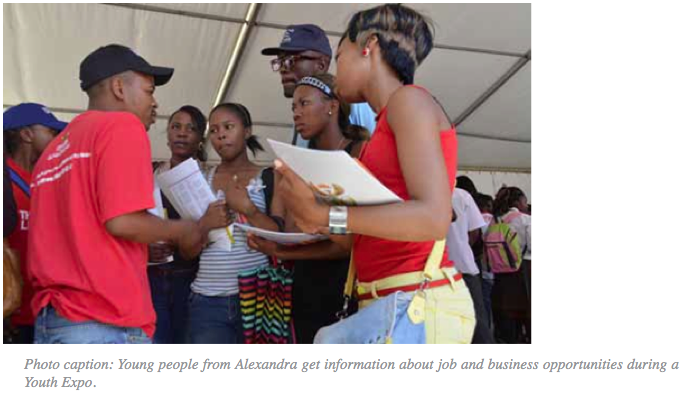 Gauteng, which was hosted by the National Youth Development Agency (NYDA) and the office of Deputy Minister for Performance Monitoring and Evaluation, Obed Bapela.
Gauteng, which was hosted by the National Youth Development Agency (NYDA) and the office of Deputy Minister for Performance Monitoring and Evaluation, Obed Bapela.
Xaba found information about bursaries, learnerships and other opportunities being offered to the youth – information that meant a little less stress and more hope for the future. “Now I know there are places I can go to for help and that has given me hope. I know that when I finish school I will have opportunities even if I don’t have money,” the Minerva High School pupil said.
Hope
The expo also gave hope to fellow Alexandra resident Thabiso Kgasoame, who dropped out of school in Grade 11. He currently works in the retail industry but his dream is to open his own business.
“I want to manufacture match boxes but I’ve been struggling to get funding for this business,” he said.
Kgasoame was more optimistic after viewing exhibitions at the expo. “I’ve been told that the NYDA offers help for youth like me who want to start their own business. I spoke to them and it sounds promising,” he said.
Motivate and inspire
The expo was aimed at bringing programmes, products and services of the private and public sectors, civil society and related institutions closer to the youth of Alexandra, with a specific focus on education and entrepreneurship opportunities.
It also brought the local youth face-to-face with a number of celebrities, including TV presenters, actors and music stars.
Bapela said that the intention was to motivate and inspire the youngsters.
“They must continue to have dreams and hopes. All the people they are seeing on TV, all the leaders, they all came from humble beginnings but worked hard to make something of themselves. Our message is that these young people can do the same,” he said.
Hard work
The expo was also aimed at introducing the Young people from Alexandra get information about job and business opportunities during a Youth Expo. NYDA to youth and to make them aware of how they could use the NYDA for their benefit, the Deputy Minister added.
He stressed the importance of education, saying no matter where the youngsters found themselves in the future, they would always need an education to fall back on.
Deputy Minister Bapela urged the youth to focus on their studies, dream big and work hard to achieve those dreams.
Opportunity providers
NYDA CEO Steven Ngubeni said the agency wanted to educate Alexandra youth, specifically those who didn’t have the means to visit the offices in Johannesburg and Midrand, about the NYDA and the services if offered.
A number of “opportunity providers”, including government departments and non-government organisations, exhibited at the expo, he pointed out.
“We are empowering the youth of Alexandra with information. We are targeting youngsters who are still at a school-going age because we want them to be motivated and to know that there are all these opportunities waiting for them once they finish school,” Ngubeni added.
Contact the NYDA on 080 052 5252 for visit the website – www.nyda.gov.za
NYDA pledges support for ‘Heroes’ nominee
NYDA pledges support for ‘Heroes’ nominee sadminYouth matters
The National Youth Development Agency (NYDA) was so impressed by the work done by an exceptional community upliftment initiative that it pledged R400 000 towards it.
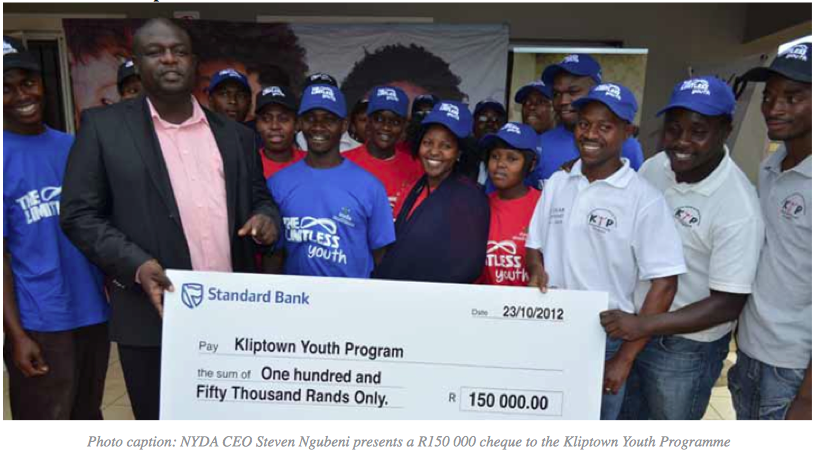 The Kliptown Youth Programme (KYP) headed by 30-year-old Thulani Madondo, has been nominated for the annual CNN Heroes and profiled earlier this year on CNN. CNN’s global audience nominate 10 everyday heroes around the world each year. Madondo co-founded the KYP after identifying the need to provide a means to inspire and change lives in the troubled Soweto community.
The Kliptown Youth Programme (KYP) headed by 30-year-old Thulani Madondo, has been nominated for the annual CNN Heroes and profiled earlier this year on CNN. CNN’s global audience nominate 10 everyday heroes around the world each year. Madondo co-founded the KYP after identifying the need to provide a means to inspire and change lives in the troubled Soweto community.
Through education, KYP’s mission is to eradicate poverty of mind, body, and soul and to improve the lives of the disadvantaged Kliptown children by providing them with educational support and after-school activities.
“The NYDA is always on the look-out for initiatives that live out our Limitless Youth slogan,” said CEO Steven Ngubeni.
Limitless youth
“This initiative is the perfect description of what our Limitless Youth campaign is all about so we’ve decided to pledge R150 000 cash towards the Kliptown Youth Programme. R50 000 will go towards a special advertising campaign calling all South Africans and Africans to vote for Thulani.
“The NYDA training and development programmes will offer R200 000 worth of services,” Ngubeni added.
The Limitless Youth initiative, which is supported by over 6 000 NYDA Twitter followers, was launched by the NYDA in April to encourage the youth of South Africa to have a ‘limitless’ mindset.
“The key messages that we are conveying to the youth of South Africa is that their potential far outweighs their limitations and that their current challenging circumstances do not have to define their future,” said Ngubeni.
However, he emphasised that the onus was on the youth to get up every day and take hold of the opportunities offered to them by not only the NYDA, but also by organisations in the private, public and civil sectors.
The ultimate CNN Hero of the Year will be decided in December, when the winner will be honoured at a tribute show hosted in Los Angeles. One of the top 10 finalists will be named CNN Hero of the Year and receive US$250 000 (R2.2 million) to continue with their work.
* Refeliwe Mphane works for the NYDA.
To learn more about the Kliptown Youth Programme visit www.kliptownyouthprogram. org.za and to pledge funds and other resources towards this initiative, contact Thulani Madondo on 011 528 8670 or send an e-mail to kliptownyouthprogram@gmail.com.
Knowing the JSE
Knowing the JSE sadminYouth matters
The Johannesburg Stock Exchange (JSE) brings to mind a fast-paced, exciting world of financial markets meant for people with lots of money.
To dispel the myth that the JSE is only for the country’s elite, the JSE partnered with the KwaZulu-Natal Financial Literacy Association (KZNFLA) to host 350 youngsters from all the corners of the province in a one- day financial literacy summit.
Learners from tertiary institutions, high schools, young entrepreneurs and youth ambassadors were taught about the importance of savings, investment and debt awareness.
According to Dudu Seme of the JSE, the purpose of the summit was to demystify the JSE.
“Without partnerships to educate the youth, we cannot hope to make the necessary impact. This partnership is fully com- mitted to financial literacy education and it believes that by focusing on the youth, this can go a long way in assisting them make informed decisions on money matters,” said Dudu.
Director of Government and International Affairs at the JSE, Geoffrey Rothschild, said young people had a huge responsibility to lead in ensuring that the needs of all the people were satisfied.
“This can only be achieved by radically in- creasing the levels of savings in our country in order to provide the necessary infrastructure for South Africa and the continent,” he added.
Entrepreneurial spirit
Learners were also taught about investment options at the JSE and encouraged to participate in investment competitions.
Ina Cronjé, MEC for Finance in KwaZulu-Natal, who is also the champion of the KZNFLA, challenged the youth to adopt an entrepreneurial spirit by starting to think along the lines of creating jobs as opposed to seeking employment. “While the idea of saving and investing may seem a lifetime away for most of our youth, it is important. “Besides energy and a passion for life, young people have a source that people of my age do not have and that is time. Time to save, time to invest, time to accumulate assets, time to prepare for retirement,” she said.
More people, better services, says Census
More people, better services, says Census sadminCensus results
The South African population has increased by almost 7 million since the last census in 2001. Handing over the official results in Pretoria to President Jacob Zuma, Statistician-General Pali Lehohla said although the population has grown, it grew at a lower rate, especially between 2007 and 2011.
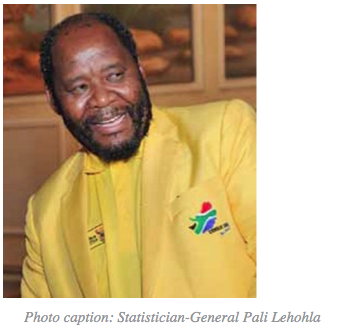 “It is a growing population, although at a rather low rate, I mean we are growing at about 1.1 per cent particularly in the years 2007 to 2011, the earlier years the growth was a little bit higher but now the growth has slowed down quite dramatically,” he said.
“It is a growing population, although at a rather low rate, I mean we are growing at about 1.1 per cent particularly in the years 2007 to 2011, the earlier years the growth was a little bit higher but now the growth has slowed down quite dramatically,” he said.
Speaking before receiving the results, President Jacob Zuma said it was important for South Africa to conduct a census if it wanted to achieve its development agenda.
“South Africa cannot fulfill its development agenda unless we know who we are, where we live, work and play and what we need to better our living conditions in the country. There is no better yardstick to achieve that than to undertake population censuses periodically,” he explained.
In 1996 the population was counted at 14.8 million, in 2001 it was 44.5 million and in 2011, the population stood at 51.7 million. Census 2011 was the third to be conducted since post democratic elections in 1994.
Census 2011 was conducted from 9th to 31st October 2011 across the country.
Access to services
Termed “The South Africa I know, the home I understand”, the census analysed South Africa’s demographics, population distribution, access to services, average household size, income, migration and mortality.
During the counting, 14.6 million doors across the country were knocked on with only 4.7 per cent of those found to have been vacant termed as an undercount in statistics language. There were a total 103 000 enumeration areas. A total of 135 380 people were employed over the course of the census, while 7 067 branded cars were used. The figures show that 63 per cent of the workforce was female and the majority of those employed were between the ages of 20 to 29.
Gauteng and KwaZulu-Natal account for 42 per cent of South Africa’s population, with Gauteng overtaking KwaZulu-Natal as the most populous province in the country and surpassing it by 2 million (12.3 million in Gauteng, compared to 10.3 million in KwaZulu-Natal). The Eastern Cape recorded a population decline in the national population and housing count, slowing from 15.1 per cent in 1996 to 12.7 per cent in 2011.
The fastest growing province in South Africa is Western Cape which grew at 29 per cent followed by Gauteng, Mpumalanga and North West which grew collectively at 26 per cent between the two censuses.
Migration
“One of the major demographic shift is one caused by migration, we saw heavy streams of migration to Gauteng. It has been growing, in fact, Mpumalanga, Gauteng and North West, that N4 connection, is having quite a strong population growth.
“This could be as a result of the mineral base that we find there. Gauteng as the main province of economic activity and Mpumalanga with the Maputo corridor, we see a lot of growth around that, and the Western Cape having grater population as well,” Lehohla said.
The statistical release indicates that 1 million people moved to Gauteng in the last decade, and that only 56 per cent of people living in Gauteng today were born there.
Census 2011 puts the country’s average age at 25, an indicator that South Africa, albeit getting slightly older compared to the two previous censuses, continues to have a youthful population. The average age according to the 1996 and 2001 census was 22 and 23, respectively.
In line with global trends, South Africa’s sex ratio was skewed in favour of women with 2 million more females in the country than men. Census 2011 recorded 27 million females. “This means that on average, South Africa had a sex ratio of 95 (95 males per 100 females),” explained Lehohla.
Meanwhile, South Africa’s average household income increased by 113 per cent, climbing from R48 385 in 2001 to R103 204 in 2011.
The highest average household income was in Gauteng, which topped other provinces at R156 243. Limpopo remained the province with the lowest average annual household income of R56 844, followed by Eastern Cape with an average of R64 539.
 Electricity
Electricity
- The proportion of household using electricity for lighting increased from 58.2 per cent in 1996 to 84.7 per cent in 2011.
- The proportion of households relying on paraffin decreased from 12.7 per cent in 1996 to 5.3 per cent in the 2007 Community Survey to 3 per cent in 2011.
- The proportion of households that depended on candles decreased from 28.7 percent in 1996 to 11.4 per cent in 2011.
- The proportion of households using electricity as a source of energy for lighting by province increased over the period. The highest proportion was recorded in Western Cape (93.4 per cent) while the lowest was recorded in Eastern Cape (75 per cent).
- The proportion of households using electricity for cooking increased from 47.5 per cent in 1996 to 73.9 per cent in 2011.
- The proportion of households using paraffin decreased from 21.6 per cent in 1996 to 8.5 per cent 2011.
- The proportion of households using wood for cooking decreased 23 per cent in 1996 to 12.5 per cent in 2011.
- The proportion of households using coal as a source of energy for cooking decreased from 3.6 per cent in 1996 to 0.7 per cent in 2011.
Delivery of water and sanitation
- The proportion of people having access to water is high in all provinces.
The highest proportion of those with piped water inside the dwelling or yard is in:
- Gauteng with 89.4 per cent
- Free State with 89.1 per cent
- Western Cape at 88.4 per cent of households.
The proportion of households that reported to have no access to piped water is highest in:
- Eastern Cape: 22.2 per cent
- KwaZulu-Natal: 14.1 per cent
- Limpopo: 14 per cent.
Sanitation
 The proportion of households that have flush toilets connected to the sewage sys- tem increased persistently to 57 per cent in Census 2011 from the 50 per cent and 55 per cent recorded in Census 2001 and Community Survey (CS) 2007, respectively.
The proportion of households that have flush toilets connected to the sewage sys- tem increased persistently to 57 per cent in Census 2011 from the 50 per cent and 55 per cent recorded in Census 2001 and Community Survey (CS) 2007, respectively.- The proportion of households using pit toilet with ventilation increased to 8.8 per cent in Census 2011 from 5.6 per cent and 6.6 per cent in Census 2001 and CS 2007 respectively.
- The bucket toilet system was more common in Census 2001 with 3.9 per cent compared to 2.2 per cent in CS 2007 and 2.1 per cent Census 2011.
- The proportion of households which had no toilets declined significantly from 13.3 per cent in Census 2001 to 8.3 per cent in CS 2007 and 5.2 per cent in Census 2011.
 Education
Education
- The percentage distribution of persons aged 20 years and older with no schooling halved over the period 1996 to 2011.
- The proportion of the population that completed matric has increased from 16 per cent in 1996 to 29 per cent in 2011.
 Percentage distribution of household by type
Percentage distribution of household by type
- The proportion of households living in formal dwellings increased from 65.1 per cent in 1996 to 77.6 per cent in 2011.
- The proportion living in traditional dwellings decreased from 18.3 per cent in 1996 to 7.9 per cent in 2011.
- The proportion of people living in informal dwellings decreased from 16.2 per cent in 1996 to 13.6 per cent 2011.
 Refuse removal
Refuse removal
- The proportion of households whose refuse is removed by local authority weekly increased from 52.1 per cent in 1996 to 62.1 per cent in 2011.
- Those whose refuse was removed less often decreased from 2.2 per cent in 1996 to 1.5 per cent in 2011.
- Households depending on communal refuse dump decreased from 3.2 per cent in 1996 to 1.9 per cent in 2011.
- There is a minor decrease in those using own refuse dumps from 32.6 per cent in 1996 to 28.2 per cent in 2011.
- The proportion of households that had no rubbish disposal facilities decreased significantly from 9.7 per cent to 5.4 per cent in Census 1996 and 2011, respectively.
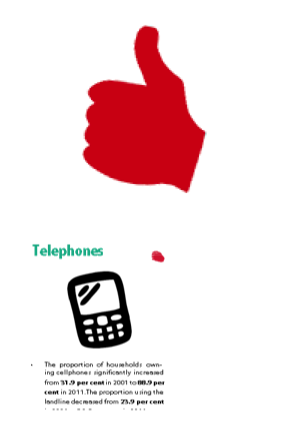 Telephones
Telephones
- The proportion of households owning cellphones significantly increased from 31.9 per cent in 2001 to 88.9 per cent in 2011. The proportion using the landline decreased from 23.9 per cent in 2001 to 14.5 per cent in 2011.
Average household income
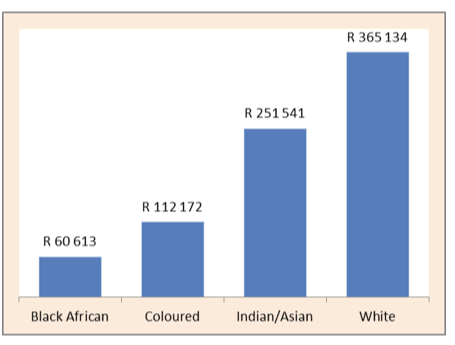
Letters to the Editor - Give us a piece of your mind
Letters to the Editor - Give us a piece of your mind sadminStop killing rhinos
We must educate our communities about the importance of animals. These days rhinos are killed in large numbers and if it doesn’t stop, they will soon be extinct. People must be educated because those who kill rhinos believe the false in- formation they get, which con- tributes towards the killing. I encourage everyone to participate in protecting animals by being involved in campaigns. I was hurt to hear that a pregnant rhino was killed.
People must stop killing them so that they will be able to breed and increase in numbers. So let us all stand together to protect our wildlife.
– Matlala Maraba, Ga-Mashashane, Limpopo
Let’s make the next generation proud
We are lucky to witness the freedom that our fellow South African citizens had fought for, but let our excitement not blind us to the fact that some of the things we have strived for have not yet been achieved. Apartheid was overcome, everyone is free, but still we have to fight issues such as crime, poverty and unemployment that have become a threat to us.
If only we can continue with the enthusiasm of those who fought apartheid, we will achieve more. Rome wasn’t built in one day, so let’s continue fighting to make the next generation proud.
– Nthabiseng Mokoena, Moko
We would like to hear from you
If any of the information published in Vuk’uzenzele has helped you in any way to improve your life, we would like to hear from you. Don’t forget to include your telephone or cellphone number and address.
Send your letters to:
Vuk’uzenzele, Private Bag x745, Pretoria, 0001.
E-mail: vukuzenzele@gcis.gov.za.
If you don’t want your real name published you may use a different name, but please include your real name and address.
PLEASE NOTE: To win a prize you must include a physical address and a contact telephone number.
Facebook comments
 http://www.facebook.com/pages/ukuzenzele/171911042918437
http://www.facebook.com/pages/ukuzenzele/171911042918437
PRISCILLA SISI LECWIDI: “I love this newspaper. It’s free, easy to get and has all the information one needs. It can also be used for future generations.”
ERALD NONYANE: “Take control of your tomorrow! Begin today with Vuk'uzenzele.”
SIPHO TSHABALALA: “I hope that we will get more information about small businesses, funding and help with the sponsoring of working material in Vuk’uzenzele.”
THABILE zOkOTHE NDIMA: “We need more learnerships.”
PETRUS SEFAkO: “Vuk’uzenzele is awesome.”
Nigerian girl, 12, launches Braille book
Nigerian girl, 12, launches Braille book sadminShe is just 12 years old and blind, but Nigerian girl Adeife Unwumsnachi Adeniran has already written a book. Adeife, who attends Prinshof High School for the Visually Impaired in Pretoria, recently launched her very own book titled, Can You Imagine, to coincide with Disability Month, which runs from 3 November to 3 December.
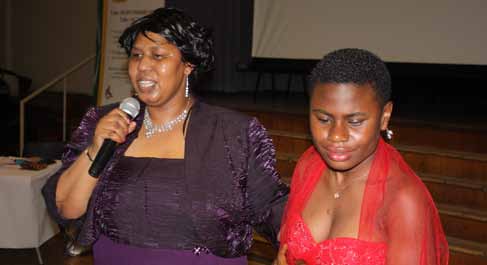 The book is written in English and Braille. “When I came to this country, I couldn’t do many things. I chose writing because I could express my imagination. I found that many people couldn’t understand what I was saying. Also, when visiting the library, I realised that there were not enough books in Braille,” Adeife explained.
The book is written in English and Braille. “When I came to this country, I couldn’t do many things. I chose writing because I could express my imagination. I found that many people couldn’t understand what I was saying. Also, when visiting the library, I realised that there were not enough books in Braille,” Adeife explained.
“Even if my book doesn’t become a hit, at least it would have made it to the shelves and there will be one extra book in Braille. When you are blind you can see the other side of the world that others don’t see. For me, it’s good to be blind. Disabled people are not a write off. We also have a voice. We are not disabled but differently abled,” she pointed out.
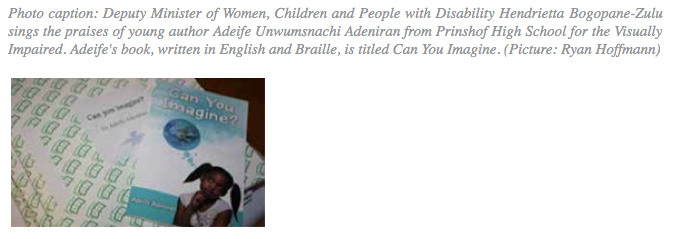 Love for writing
Love for writing
Adeife took three months to complete the 40-page book. It is based on the challenges facing diplomatic parents who relocate from the United States to South Africa.
Adeife has always had a love for writing which started off as a hobby, but she later convinced her parents to help her publish her book.
The launch was attended by Deputy Minister of Women, Children and People with Disability Hendrietta Bogopane-Zulu, who is also visually impaired.
Minister Bogopane-Zulu praised Adeife for being a role model, saying she would be an inspiration for other disabled people her age. “As the Department of Women, Children and People with Disability is our responsibility, our job is to ensure that the rights of these people are defended.”
Special guest
She said parents with disabled children could either celebrate them or keep them hidden from the rest of the world. “During Disability Month ask yourself what you did for the development of people with disability,” said Minister Bogopane-Zulu.
The minister invited Adeife to be her special guest during the final Disability Month celebration to be held in Mpumalanga and which will be attended by President Jacob Zuma.
Nigerian Consul General Okey Emuchay said his country was learning a lot from the South African government.
“This is a challenge for Nigeria, there are no schools and teachers for disabled people. Today is important we salute you South Africa,” Emuchay said.
Adeife has written other books for her friends and family, which have not yet been published.
Spend wisely this festive season
Spend wisely this festive season sadminThe “silly season” has arrived, which is an exciting time of fun and celebrations, but also often causes us to spend money impulsively. Although we are looking forward to our gifts and holidays, the best gift we can give ourselves and our families this festive season is to make good financial decisions.
We tend to spend carelessly in December on unnecessary items, which is tantamount to throwing money away. Your spending behavior in December will determine your financial trend for the new year. Always be cautious when you are tempted to buy goods that could later see you falling into debt for months or even years.
Draw up a budget
The first step to ensuring that you spend wisely this festive season is to draw up a realistic budget. You must be honest with yourself on how much you spend and not what you think you can spend. Your budget should guide you to spend responsibly during December and January.
Start by prioritising your living expenses such as rent/bond, food, lights and water, insurance, debt, school fees, stationery and school uniforms. Over and above your daily living expenses and debt, you need to state clearly what is available for gifts, travel and entertainment over the festive period.
If you are planning to go away on holiday, don’t leave things until the last minute. Book as early as possible for accommodation, flights, trains or bus travel. You may get a better price for booking early and you’ll save yourself the stress and cost of having to take whatever is available at the last minute.
Tips to spend wisely
- Avoid buying on impulse such as expensive gifts that you did not budget for.
- Resist those SALE signs. Limit your visits to the mall.
- If you did not budget for a festive season trip/holiday, stay at home. There are many fun things to do in your own city or town.
- If you are lucky enough to get a bonus, pay up some of your debt (highest interest-bearing first).
- If you didn’t save, don’t borrow to spend.
- Instead of entertaining friends at an expensive restaurant, rather have a braai at home and ask guests to contribute with salads and beverages.
- Limit yourself to an amount for each person’s gift to help keep track of your spending. Gifts don’t have to be expensive – it’s the thought that counts.
- Don’t make dramatic changes to your spending patterns during the festive season. Try to keep to your normal spending pattern.
- Enjoy the festive season and be safe!
Marilyn Williams, Debt Counsellor: 0861 777 293
Grab opportunities, Minister Dlamini urges
Grab opportunities, Minister Dlamini urges sadminResidents of Thembalethu in George recently had an opportunity to raise their concerns in person with Minister of Social Development Bathabile Dlamini. For one young mother this was a particularly special occasion, as she was served by the Minister in the new office and her grant application was approved.
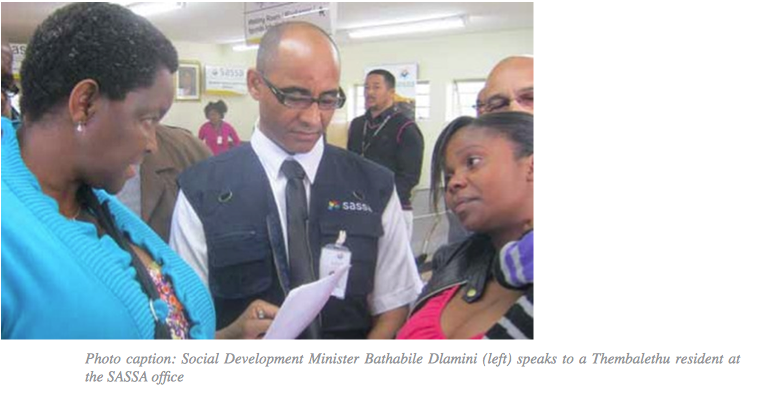 Gathering at the new South African Social Security Agency (SASSA) offices in Thembalethu, community members also received food parcels from the Minister.
Gathering at the new South African Social Security Agency (SASSA) offices in Thembalethu, community members also received food parcels from the Minister.
Taking time to open the new SASSA office at the local Thusong Centre during her Community Dialogue visit, Minister Dlamini urged the community to take care of and respect the new facility. She also asked community members to report SASSA staff who did not serve them with courtesy.
Respect the elderly
Encouraging them to look after the elderly, Minister Dlamini said, “Some of you neglect the elderly and only pretend to care when they have to receive their pension grant. This is totally unacceptable, you take advantage of these old people mainly because they can’t report you.”
Residents used the opportunity to raise issues with the minister and unscrupulous micro lenders seemed to be the major problem. Community members accused the loan sharks of operating right next to the pension pay point to demand payment from people
who had just received their grants.
People also raised concerns about delinquency among youngsters. Unemployed youth end-up getting involved in drugs and substance abuse and young girls fall pregnant. The local municipality was also accused of corruption in the tendering of Early Childhood Development (ECD) centres in the area. Youth accused the local authorities of not considering the black communities when it came to internship programmes in the area. The issue of land and housing was also raised.
Use opportunities
After consultations with community, Minister Dlamini challenged the youth to stop folding their arms and to start using opportunities offered by government through initiatives such as internships and bursaries. “People are always complaining that we as government are not doing anything whereas your children are not using the opportunities that we present to them. We have FET colleges, why are your kids not there? People should wake up and do something and not only expect things to come to their door-step,” said the Minister.
Regarding the ECD centres, the Minister said she had not heard the allegations of corruption before. “I can tell you now that government contributes R15 per child in ECD and also it is the responsibility of local government to build the structure and look after it.” She promised to take up this matter and other local issues with the provincial authorities.
Unemployed youth who passed matric with exemption and wanted to pursue a career in social welfare were called to the podium and their details were recorded.
* Mfundo Magaba works for the GCIS Parliamentary Office.
Municipalities gear up to improve services
Municipalities gear up to improve services sadminA report compiled by auditing firm PricewaterhouseCoopers (PwC) has identified shortcomings and proposed new ways for municipalities to carry out their duties. The report calls on municipalities to “urgently implement strategies that allow them to compete for business investment, retain talent and attract visitors”. Put together in collaboration with the South African Local Government Association (SALGA), the report recommends ways of putting effective systems and personnel in place to speed up service delivery.
Called ‘Making it happen – a roadmap for South African municipalities to achieve desired outcomes’, the report was based on 36 surveys completed by six district councils, 23 local and seven metropolitan municipalities in all nine provinces.
Achievements
Welcoming the report, SALGA boss Xolile George said, “All of us know that there are a number of achievements. Local government is quite stable in our system of government. Local government is implementing capital investment projects in terms of ensuring access to service for citizens. Citizens have so far been able to get services such as water, electricity and housing.”
The report focuses on how city and municipal managers in South Africa can best execute their municipality’s strategies and deliver their vision in this new era.
It sheds light on how municipal leaders can deliver their desired outcomes and how municipalities can overcome budget constraints while still developing and improving their local economies.
Local government
George thanked PwC for ensuring that SALGA became central in partnering with the auditing firm to identify some of the measurements PwC has looked at globally and for bench- marking to see whether the South African local government sector could compare with the rest of the world.
“Local government is executing a very difficult task of making sure that it lives up to the expectations of citizens. Our central mandate is to make sure that the South African system of local government is strengthened to be able to discharge its responsibilities properly,” he said.
George singled out the City of Johannesburg for its ground-breaking initiatives such as the Bus Rapid Transport system and improving the urban form of townships. He added that 90 per cent of the success of the 2010 FIFA World Cup was owing to the central role played by cities.
Global Cities and Local Government Net- work leader, Hazem Galal, said PwC would assist local government to create sustainable metropolitan, district and local municipalities. "Our engagement style is based on a strategic partnership in which we work with local government and its stakeholders to co-design, co-implement and sustain new ways of working to ensure that local government entities deliver on their core mandates,” he said.
Build capacity
"We assist local government to develop leaders to truly lead, deliver and manage within the local government context. They should also build capacity and manage talent to attract, develop and retain the right people; assess to determine limitations and internal shortcomings that prevent optimal service delivery and design transformation programmes to improve service delivery," Galal said.
He also encouraged municipalities to be- come competing societies by adopting a more collaborative role.
The study also discloses the barriers and difficulties cities and municipalities encounter in their efforts to build the capabilities they require to execute their strategies.
The Municipal Demarcation Board (MDB) recently released the State of Municipal Capacity Report for 2010/11 which shows that
72 per cent of municipal posts were fi nationally the fi year. Limpopo had the highest vacancy rate, with only 61.5 per cent of it posts filled.
Filling vacant posts
MDB Chairperson Jackie Mahlangu said 76.4 per cent of posts in municipalities’ organograms were budgeted for, adding that it remained a challenge to fill posts in rural municipalities.
“Of the funded posts, where municipalities can afford to fi these posts, 32.5 per cent remain vacant. It is significant that almost one in three budgeted posts nationally are vacant,” he said.
Mahlangu added that work experience for Section 57 managers was consistently the lowest in the Free State.
Section 57 is a term commonly used for managers employed according to the requirements of Section 57 of the Local Government: Municipal Systems Act.
“Municipalities in the Western Cape have the most experienced municipal managers, chief financial officers and technical service managers. Gauteng has the most experienced corporate services and integrated development plan managers and North West, Gauteng and the Free State’s municipal managers are on average very new to their positions as compared to other provinces,” he said.
Spotlight on road safety in Africa
Spotlight on road safety in Africa sadminThere should be more collaboration, improved infrastructure and awareness campaigns for road users throughout Africa.
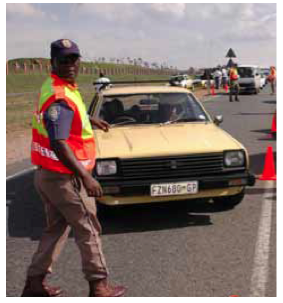 This was the dominant sentiment at the second Africa Road Safety Conference held recently in Boksburg.
This was the dominant sentiment at the second Africa Road Safety Conference held recently in Boksburg.
The conference was organised by the South African Road Federation and the Road Traffic Management Corporation (RTMC) in partner- ship with transport stakeholders.
It comes after the United Nations Decade of Action for Road Safety 2011 – 2020, which was launched globally on 11 May 2011, and aims to save lives by halting the increase in road traffic deaths and injuries worldwide.
The aim of the conference was to review the progress on action to date and reinforce co- operation between road safety stakeholders.
Safer road users
Speakers deliberated on measures and action which can be taken to strengthen institutional capacity, provide safe road infrastructure, safer vehicles, safer road users, education, awareness and enforcement to ensure that fatalities and serious injuries are reduced.
Globally, more than 1. 2 million people die in road accidents annually. Of these deaths, 65 per cent involve pedestrians, with 35 per cent of them children. Annually, an estimated 50 million people are injured as a result of road accidents.
In South Africa just under 14 000 people are killed and many more injured costing the economy more than R300 billion a year.
Fatal crashes
Speaking at the conference, acting Chief Executive Officer of the RTMC Collins Letsoalo said South Africa had an unacceptably high level of fatal crashes leading to a high rate of fatalities.
“Compared to the world standards, South Africa ranks high with about 27 fatalities per 100 000 compared to 10.3 fatalities per 100 000 globally.”
He indicated that head-on collisions, multiple-crash vehicles and single overturned vehicles were the major crash types. Human error, vehicle errors, and road and environmental conditions are the major contributing factors. There was a need to develop a proper model for road traffic injuries surveillance systems that would emphasise prevention, was multi-disciplinary in nature, science based, population based and consistent, Letsoalo added
Win-win trade relations for SA and China
Win-win trade relations for SA and China sadminInternational relations
Trade between South Africa and China keeps rising as the relations between the two countries deepen.
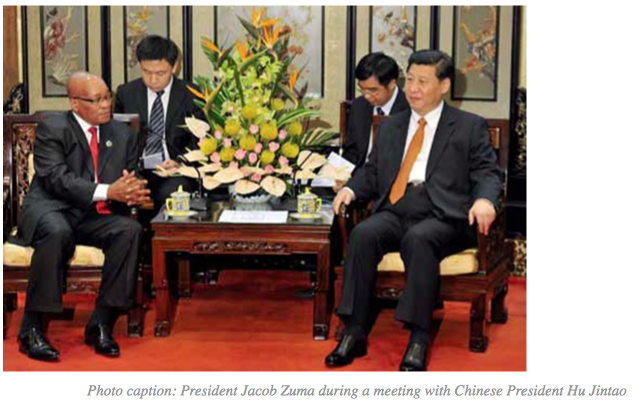 According to the Department of Trade and Industry (dti), South Africa’s exports to China reached an all-time high of R85 billion in 2011, an increase of 45 per cent over 2010.
According to the Department of Trade and Industry (dti), South Africa’s exports to China reached an all-time high of R85 billion in 2011, an increase of 45 per cent over 2010.
In October, 63 South African businesses looking to penetrate China’s huge market exhibited their products at the annual South African Expos in Beijing and Shanghai. The most popular South African product at the expo was agro-processing, especially wine.
At the same time, China’s International Brand Management Centre (IBMC) and Trade and Investment South Africa signed a Memorandum of Understanding (MoU) which will assist the South African enterprises to gain access into the Chinese market.
Comprehensive services
The MoU stipulates that the IBMC will provide comprehensive services to introduce and promote South Africa’s products and services in the Chinese market. It will also develop local distributors for selected South African enterprises, exporters and distribution channels.
In 2010 South Africa and China signed a Comprehensive Strategic Partnership Agreement. This agreement identified agro-processing, chemicals, plastics, steel, aluminium, automotive, capital equipment, manufacturing, electro technical, and paper and pulp as the top 10 products South Africa could export to China.
For its part, China has also been aggressive in penetrating the South African market. Recently, Transnet announced a consortium led by China South Rail (CSR) Zhuzhou Electric Locomotive as the winning bidder to supply 95 electric locomotives for its massive drive to upgrade its freight rail.
Transnet will pay R2.6 billion for the 95 locomotives, the first 10 of which will be assembled in CSR’s factories in China, while the remainder will be made in South Africa.
Producing jobs
Chinese manufacturer First Automobile Works, has also invested US$100 million (R884 million) to build a vehicle and truck assembly plant in Coega. According to the dti, the project President Jacob Zuma during a meeting with Chinese President Hu Jintao has produced 1 000 jobs to date.
Director-General at dti, Lionel October, said the relationship between the two countries should be seen more as a continent to continent relationship rather than two countries forming an alliance. “China’s investment has grown significantly in Africa and we have seen several companies invest in numbers.”
October pointed out that this was a win- win situation of mutual economic benefit and that this would further deepen the relations between the two countries.
Brics leaders head for growth talks in SA
Brics leaders head for growth talks in SA sadminInternational relations
Preparations for the Fifth Brics Summit scheduled for 26 to 27 March 2013 are well underway.
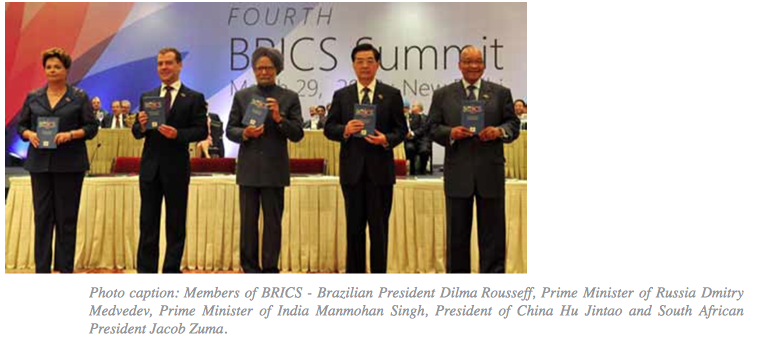 The event will take place at the Inkosi Albert Luthuli International Convention Centre in Durban under the theme “Brics and Africa: Partnership for Development, Integration and Industrialisation”.
The event will take place at the Inkosi Albert Luthuli International Convention Centre in Durban under the theme “Brics and Africa: Partnership for Development, Integration and Industrialisation”.
About 3 000 visitors including 2 000 foreign guests, are expected to attend.
Brics, consisting of Brazil, Russia, India, China and South Africa, is an association of leading emerging economies.
South Africa was invited to join the original Bric group in 2010.
Key issues
Key issues to be discussed include the launch of the new Development Bank for emerging economies and developing countries, the roles of the International Monetary Fund and the World Bank, and the Doha Round of trade talks.
South Africa has a direct interest in extending Brics cooperation to support Africa's development agenda, particularly by increasing financial aid to build infrastructure and industrial capacity, and increasing imports of value-added manufactured products from the continent.
On the issue of trade with Brics partners, Minister of Trade and Industry Rob Davies recently said that bilateral trade between South Africa and China last year grew by 32 per cent, with India by 25 per cent, while trade with Brazil grew by 20 per cent.
Bilateral trade
Bilateral trade between South Africa and Russia recovered, after a decline of 44 per- cent in 2010.
However, it is still below the R4.2 billion mark in bilateral trade recorded in 2008 between these two countries.
Bilateral trade with China totalled R188 billion in 2011, while the figure stood at R55 billion with India, R18 billion with Brazil and R3.8 billion with Russia.
The recovery in bilateral trade between South Africa and its Brics partners follows on increases in trade in 2010, after declining in 2008 and 2009 during the global economic downturn.
Among Brics members, South African exports to China grew the most at 46 per cent, while exports to India grew by 20 per cent, to Brazil by 14 per cent and by 7 percent to Russia.
In terms of the balance of trade, South Africa has run a trade surplus with Russia in the last two years of R1.3 billion and R1 billion after running trade deficits in 2008 and 2009.
South Africa moves up at the United Nations
South Africa moves up at the United Nations sadminInternational relations
From January 2013 South Africa will serve a three-year term as a member of the Economic and Social Council (ECOSOC) of the United Nations (UN).
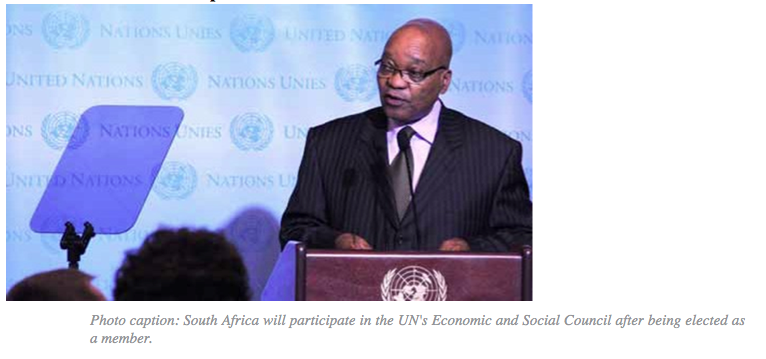 ECOSOC is a central forum for discussing economic, human rights, health, social and cultural issues at the UN.
ECOSOC is a central forum for discussing economic, human rights, health, social and cultural issues at the UN.
It consists of 54 members elected by the UN General Assembly. ECOSOC also drives the development agenda of the UN.
“It is significant that South Africa will be a member of this critical organ of the UN at a time when the target date for the achievement of the Millennium Development Goals (MDGs) is fast approaching, namely 2015,” the Department of International Relations and Cooperation (Dirco) said.
South Africa’s election to ECOSOC comes as the country ends its two-year non-permanent membership on the UN Security Council.
South Africa last served on ECOSOC from 2004 to 2006. According to Dirco, South Africa will use its membership of ECOSOC to lobby for the strengthening and reform of the body. “It will provide an opportunity to be located at the centre of the debate on the global development agenda, including the acceleration of the implementation of the MDGs. South Africa will also use its membership to promote the African agenda and the general developmental interest of Africa,” Dirco added.
Functional commissions of ECOSOC are the:
- Commission on Social Development
- Commission on Population Development
- Commission on Sustainable Development
- Commission on the Status of Women
- Commission on Statistics
- Commission on Crime Prevention and Criminal Justice
- Commission on Science and Technology for Development
- UN Forum on Forests.
Dirco will be the coordinating and focal point on South Africa’s engagement and participation in ECOSOC.
*Clayson Monyela is Deputy Director-General at the Department of International Relations and Cooperation.
Who will be king of football in Africa?
Who will be king of football in Africa? sadminSport
It’s all systems go for the 2013 edition of the Orange African Cup of Nations tournament. From 19 January to 10 February 2013, the world’s eyes will once again be on South Africa as 16 of Africa’s best football nations battle it out for the prestigious continental crown.
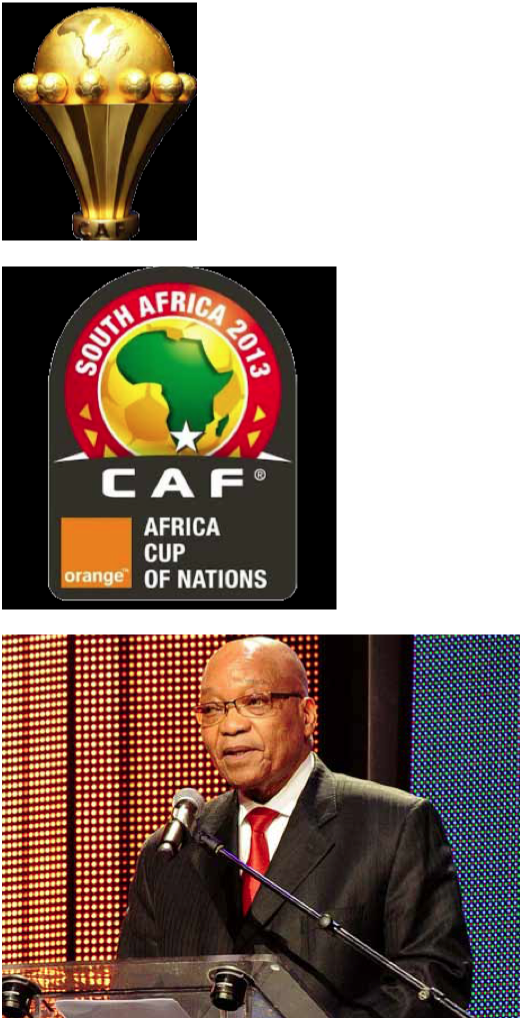 South Africa won the rights to host the tournament in 2017, while Libya was scheduled to host it in 2013. However, when the civil war in Libya forced them to withdraw, South Africa agreed to host the 2013 event. Matches will be played at five venues countrywide.
South Africa won the rights to host the tournament in 2017, while Libya was scheduled to host it in 2013. However, when the civil war in Libya forced them to withdraw, South Africa agreed to host the 2013 event. Matches will be played at five venues countrywide.
FNB Stadium will host the opening match and the fi Other matches will take place at the Mbombela Stadium (Nelspruit), Nelson Mandela Bay Stadium (Port Elizabeth), Royal Bafokeng Stadium (Rustenburg) and Moses Mabhida Stadium (Durban).
Proud track record
Speaking at the final draw of the competition in Durban, President Jacob Zuma said South Africa had a proud track record of hosting sporting events. “We are counting down the last days before South Africa hosts the 29th edition of Africa’s biggest soccer festival, for the second time. We are eagerly looking forward to host this happy festival of African football next year.”
He said government fully supported the South African Football Association and the Local Organising Committee. “We have made the necessary guarantees to the Confederation of African Football (CAF) to stage what we plan to be another successful sporting event after the 2010 FIFA Soccer World Cup.”
Government is spending R461.1 million to host the tournament of which R323 million will go to national departments to cover costs associated with hosting the tournament, including security, protocol and migration services.
A further R15 million for health-related costs associated with hosting the tournament will be allocated to provinces, while R123.1 million will go to the host cities to cover their costs.
Preview of groups
Group A
 South Africa: Hosting the tournament for the second time since readmission to the international football scene, South Africa will be among the favourites to lift the trophy in front of the home crowd. Boasting the talents of former Tottenham Hot-spur centre back and captain Bongani Khumalo, new sensation Dean Furman from English League One club Oldham Athletic and Ajax Amsterdam’s Thulani Serero, the host nation will be a tough opposition to beat.
South Africa: Hosting the tournament for the second time since readmission to the international football scene, South Africa will be among the favourites to lift the trophy in front of the home crowd. Boasting the talents of former Tottenham Hot-spur centre back and captain Bongani Khumalo, new sensation Dean Furman from English League One club Oldham Athletic and Ajax Amsterdam’s Thulani Serero, the host nation will be a tough opposition to beat.
Cape Verde: Making an appearance for the first time in the tournament, Cape Verde surprised many by knocking out former champions and powerhouse Cameroon. Playing in the opening match against the host nation, the minnows will likely find the stage too big for them against the much more experienced sides in the group.
Morocco: Winners of the competition in 1976 and ranked one place above South Africa on both the continental and world rankings, the Atlas Lions, as they are affectionately known, have failed to replicate the form that won them the tournament 36 years ago.
They have been involved in 13 editions of the competition, finishing in third place in 1908 and runners up in 2004, losing to host nation Tunisia. Boasting the likes of Arsenal striker Marouane Chamakh, they are likely to give their opponents a run for their money.
Angola: Ranked one place below the host nation South Africa, the southern African side will prove a tough side to beat having contested the past two editions. Since making their international debut against Cuba in 1997, Palancas Negras’s highlight was qualifying for the 2006 FIFA World Cup in Germany.
Group B:
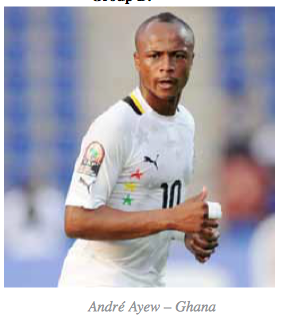 Ghana: Ranked number four on the continent, the Black Stars head into the 2013 edition of the African Cup of Nations as one of the favourites to lift the trophy.
Ghana: Ranked number four on the continent, the Black Stars head into the 2013 edition of the African Cup of Nations as one of the favourites to lift the trophy.
The Black Stars rose to African football prominence by becoming only the third African team in history to reach the World Cup quarter-finals during the 2010 tournament in South Africa. They boast the likes of Asamoah Gyan, Andre Ayew and Real Madrid’s Michael Essien.
DR Congo: The Leopards' first international success at the tournament came in the 1968 African Cup of Nations in Ethiopia, where they beat Ghana 1–0 in the finals.
Ranked number 30 in Africa, they may struggle to beat their more fancied opponents, Ghana and Mali.
Mali: The top ranked side in the group, the Eagles made football headlines after coming back from a 4–0 deficit with 15 minutes left to level 4–4 with Angola in 2010. It is considered to be one of the best comebacks in recent memory. With stars like Seydou Keita, who plies his trade in the Chinese Super League and is a former Barcelona versatile middle fielder, they may come up second to group favourites Ghana.
Niger: The bottom ranked side in the group, Niger is likely to be the whipping boys of the group. Having failed to qualify from 2006 to 2010, they only made their appearance in the 2012 edition in Angola losing all their group matches.
Group C:
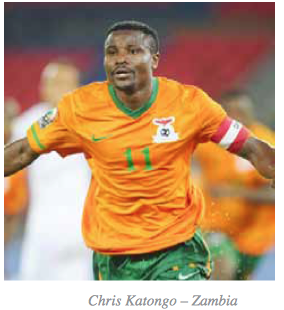 Zambia: The defending champions come into the tournament ranked number six on the continent. Having qualified through penalties against Uganda, they will be under pressure to prove that their win over the Ivory Coast in the 2012 edition was no fluke. Boasting the likes of captain Chris Katongo, Rainford Kalaba and Collins Mbesuma, they will be a tough op- ponent.
Zambia: The defending champions come into the tournament ranked number six on the continent. Having qualified through penalties against Uganda, they will be under pressure to prove that their win over the Ivory Coast in the 2012 edition was no fluke. Boasting the likes of captain Chris Katongo, Rainford Kalaba and Collins Mbesuma, they will be a tough op- ponent.
Ethiopia: Ranked number 33 on the continent, Ethiopia is renowned more for its athletic talent than for football. They will appear in this tournament as the lowest ranked team and may struggle to dominate the football pitch like they do on the athletics track.
Nigeria: The perennial underachievers of African football, Nigeria comes into the tournament ranked number 13 continentally and 63rd inter- nationally. They have only won the tournament in 1994 and had to withdraw in 1996 following violent clashes in the country. As always, they come into the tournament as favourites, but the jury is still out on whether they will rise to the occasion. Key players include John Obi Mikel (Chelsea), Peter Osaze Odemwingie (West Brom Albion) and Shola Ameobi (Newcastle United).
Burkina Faso: Ranked 23rd in Africa, the Stallions failed to qualify for the tournament in 2006 and 2008, and were knocked out in the fi round in the last two tournaments. Together with Ethiopia, they are likely to struggle against the two powerhouses of African football.
Group D:
 Ivory Coast: Coming into the tournament as Africa’s top-ranked team and 16th in the world rankings, the Elephants, as they are known, will start the tournament as clear favourites. Losing to Zambia on penalties in Equatorial Guinea and Gabon, they will come out all guns blazing with global icons like Yaya and Kolo Toure, both of Manchester City and captain Didier Drogba of Shanghai Shenhua.
Ivory Coast: Coming into the tournament as Africa’s top-ranked team and 16th in the world rankings, the Elephants, as they are known, will start the tournament as clear favourites. Losing to Zambia on penalties in Equatorial Guinea and Gabon, they will come out all guns blazing with global icons like Yaya and Kolo Toure, both of Manchester City and captain Didier Drogba of Shanghai Shenhua.
Algeria: Algeria will be one of the favourites to lift the cup in February and comes into the tournament ranked number two on the continent. They have won the tournament only once in 1990 and were runners up in 1980.
Tunisia: The Eagles of Carthage, as they are known in football circles, won the tournament in 2004 when Tunisia was the host country. They were the losing finalists in 1996 when then hosts South Africa beat them by two goals to nil. They are currently ranked seventh in Africa and 45th in the world.
With their experience in the continental show- piece, they are likely to emerge as the second best team after group favourites Ivory Coast.
Togo: Togo made headlines in the 2010 tournament when they withdrew from the competition after their bus was attacked by rebels in Angola. They have only qualified once in the last five tournaments. Leading their attack will be the influential and most recognisable face in Togo- lese football, Emmanuel Adebayo, who plays for Tottenham Hotspur in England.
